- News and opinion

Dental tourism: Patients need to know the risks
We have been working with the BBC to highlight the pitfalls of seeking dental treatment overseas.
Earlier this year we asked dentists to tell us about their experiences. Now it's leading the news, shining a light on the rise in demand for treatment overseas and the issues patients can face on their return.
Over 1,000 dentists responded to our survey, and the results are shocking:
- Nearly every dentist is seeing the results. 95% of dentists reported that they have examined patients who have travelled abroad for dental treatment. Of those 86% say they have treated cases that developed complications. Crowns were identified as the treatment most likely to need follow-up work, closely followed by implants.
- There are hidden follow-up costs. Two-thirds of dentists said that it cost patients at least £500 to repair the damage done to teeth. Over half reported that it cost more than £1,000. One in five of these dentists said the cost exceeded £5,000. Just over 40% of respondents said the remedial treatment was provided on the NHS.
- Dental tourism is on the rise. Over half reported seeing cases in the past three years, with a fifth seeing cases during the pandemic. Nearly 85% of all dentists said in their view dental tourism is a growing trend.
- Beware the hard sell. Cheaper costs were cited by 98% of dentists as the leading factor driving patients to seek treatment overseas, with nearly a third highlighting the perception of shorter waiting times. Many dentists highlighted the ubiquity of social media promotions touting the "perfect" smile.
- Patients need protection. Nearly all dentists surveyed said they had concerns about continuity of care for these patients. There were also concerns about the quality of care offered, worries about how patients would be able to complain or seek redress, while two-thirds flagged concerns over communications between the patient and the practitioner doing the treatment.
"Dentists are aware that many people are struggling to access care and may be tempted to go overseas for cut-price treatment" says our chair, Eddie Crouch.
"Patients need to provide informed consent for any treatment they have and be wary of a hard-sell, as the reality is rarely as simple as it appears on Instagram. Sadly, many UK dentists are now picking up the pieces when things go wrong."
The NHS advises people to think carefully before booking any treatment abroad, and issues a list of warning signs , many of which have been echoed by the dentists who took part in our study. The GDC also advises people to be fully aware of what to expect and what risks are involved .
But we need more. Dentists want the authorities to step up, and raise awareness of the risks, including genuinely proactive campaigns to inform the public.
However, it doesn't end there. Many are struggling to manage expectations that 'like for like' replacements will be offered on the NHS when things do go wrong. Dentists clearly need more guidance on the medico-legal ramifications of treating patients who have sought treatment overseas.
We will continue to work with government, regulators and the indemnity sector to help bring clarity to these issues, and ensure our patients are fully informed of the risks they face.
The documentary Turkey Teeth: Bargain Smiles or Big Mistake? is now available on BBC iPlayer
What is Dental Tourism

In this article
What is Dental Tourism?
Dental tourism refers to traveling abroad to get dental treatment. Many people have left, or plan to leave, their country of residence for a “dental vacation.” They may seek higher-quality care, a more attractive price, or both.
Defining the Phenomenon
Visiting another country for dental care is an increasingly common form of medical tourism. Medical tourism, including dental tourism, can be divided into three basic categories:
- Going from a less developed country to a more developed country to access a higher standard of care — This is more common, as some procedures used to be available only in certain parts of the world.
- Going from a developed country to a country where equivalent dental care is less expensive — This trend is rising as many countries offer more advanced medical treatment.
- People living abroad who return home for dental care — This is also increasingly common due to global migration.
This article focuses on the second type of dental tourism. For well-established dental treatments such as dental implants, going to a less expensive country is an attractive option for many people.
Calculate your dental savings now with a DentalPlans plan. Visit DentalPlans.
Benefits and Risks of Dental Tourism
As dental tourism becomes an increasingly compelling option for many people, it’s worth considering the benefits and potential risks. While the advantages of traveling for dental care may seem obvious, the drawbacks may not be as obvious.
Advantages of Seeking Dental Treatment Abroad
There are several potential advantages to dental tourism as an alternative to treatment at home, including:
- Cost-effectiveness — Dental tourist destinations may offer the same quality of care at home but at a fraction of the price. Many clinics cater specifically to foreigners and cultivate a reputation for affordability and expertise.
- The travel experience — Besides getting affordable dental care, tourism’s usual benefits include seeing new places, meeting new people, and having experiences that wouldn’t be possible at home.
- High-quality procedures — Travel may be necessary to access the treatment you seek. This depends on your country of origin, as some countries still have an advantage over others regarding the most advanced procedures.
Concerns and Potential Pitfalls
There are also some potential disadvantages to traveling abroad for dental treatment. These include:
- Risk of low-quality care — The price these dental offices offer may be attractive, but there’s a risk of providing poor care and/ or using low-quality materials
- Little to no recourse — If you receive low-quality treatment in a foreign country, you may not have any legal or financial recourse as a non-citizen
- Long travel times — Air travel may impact recovery, increasing the risk of complications such as post-operative bleeding
- Leisure versus recovery — Drinking, dancing, or eating certain foods may compromise the results of your treatment
- Local diseases — Contracting a disease you aren’t immune to is another potential pitfall that could harm your ability to recover
Which Countries are Best for Dental Tourism?
Some of the most popular destinations for dental tourism include:
- Costa Rica — Offers state-of-the-art dental care at about a third of the cost of the US; many doctors, like those at Cavallini International Dental Clinic , have trained at US or Europe dental schools
- Mexico — Has many quality dental offices that treat Americans and other foreigners; the border city of Los Algodones, nicknamed “Molar City,” is home to hundreds of dentists
- Thailand — An increasingly popular dental tourism destination for Australians and New Zealanders; they can save half or more on dental work at offices like Bangkok International Dental Center
- Hungary — The top destination for Brits, Germans, and other Europeans seeking dental care abroad; clinics like Medicover in Budapest offer dental implants and other procedures at half or even a quarter of the cost at home
Other increasingly popular countries for foreigners seeking dental care include Spain, Poland, Romania, the Dominican Republic, Turkey, and the Philippines.
The best country for you to visit will depend on your preferences, current location, available funds, and any cultural association you might have with the country in question. You should choose a reputable dentist with a proven track record wherever you decide to go.
Why is Dental Tourism Thriving?
The trend of people visiting dental clinics abroad (that cater to foreigners) has grown significantly during this century.
This type of dental tourism is on the rise for several reasons:
- A good deal for the patient — Many people from countries like the United States are affluent by global standards but find it difficult to afford certain dental procedures at home. This makes them ideal customers for high-quality dental clinics in less affluent countries.
- A good deal for the dentist — The clinic can charge a price higher than average within their country but still favorable for the foreign patient.
- An opportunity for travel — Dental tourists can enjoy the other perks of vacationing abroad. They can bring family and friends, visit attractions, etc.
- Favorable location — The above benefits can be found in nearby countries for dental tourists. North American dental tourists can go to Latin American countries, Australians can go to Thailand, and Germans and Austrians can go to Hungary or Romania.
Tired of paying full price for dental work? Save with Discount Dental Plans. Learn more here or call (833) 704-2246
Cost of Dental Tourism
The total cost of a dental vacation takes into account the cost of treatment, travel, and accommodation. Keep this in mind and weigh these factors against potential risks.
Other costs you’ll want to take into account may include:
- Travel expenses — Getting to your destination country and back, plus what you’ll need to get around once you’ve arrived (taxi and bus fares, etc.)
- Accommodations — The cost of a hotel, hostel, Airbnb, or on-site guest house
- Food and leisure — Enough to live day-to-day while abroad, plus any excursions you want to take, souvenirs you plan to buy, etc.
It’s possible that when everything is accounted for, the total cost of your trip will still be significantly less expensive than getting treatment at home. This is the bargain dental tourists are typically hoping to achieve.
On the other hand, the total cost may be more expensive than just getting treatment at home. You should rethink your plans or decide if the trip is still worth the expense.
Does Insurance Cover Dental Tourism?
Dental insurance may cover out-of-country treatment. Many travel insurance policies also cover dental treatment (however, this is typically only for emergencies).
If you’re living or working abroad long-term, you may want to consider an international health insurance policy with a global network of care providers. Dental coverage can often be included in this kind of policy.
If you have dental insurance, do the following to ensure you’re covered before traveling:
- Check with your insurer
- Find out any requirements your insurer places on out-of-country treatment (it may be handled differently than treatment at home)
- Make sure your dental clinic files any necessary documentation
- Be ready to pay out of pocket at the clinic (your insurance may require this, reimbursing you after the fact)
Even without insurance, dental tourism may get you a better deal than getting treatment at home. But only you can determine this.
Thoroughly research your options, and consider getting dental insurance (and travel insurance) if you don’t already have it. Remember that there may be a waiting period between starting your policy and getting full coverage.
Tips for a Safe Dental Tourism Experience
You’ll need to plan beforehand to ensure a safe and successful trip. Before committing to going abroad as a dental tourist, here are some steps you’ll want to take:
Research Thoroughly
Do your research to ensure quality treatment with a reputable dentist. Before traveling, you’ll want to:
- Choose a dentist — Pick a dental clinic with verified experience with foreign patients, using their website and any available reviews to vet them and make an informed decision.
- Make a plan — Contact your clinic of choice to establish a treatment plan and schedule and settle any logistical or financial questions.
- Know where you’ll be staying — Know how close your hotel, hostel, or Airbnb will be to the dental office, and plan for transportation back and forth. Some clinics that cater to foreign patients offer on-site guest rooms.
Before embarking on your trip, you should eliminate as many uncertainties as possible about the reputation of your dentist and the quality of treatment you can expect.
Consider Your Treatment
The specific dental procedure you’re getting may dictate your travel schedule. Be ready to plan multiple trips or a longer stay if necessary.
For example, many people going abroad for dental care seek dental implants. Implant surgery generally requires at least two visits:
- One to place the implants and temporary crowns
- A second visit several months later, after you’ve healed, to place permanent crowns
Consider having your dentist at home handle the permanent crowns, but getting the information they need from the original dentist may be difficult. You’ll likely need to plan two multi-day stays several months apart for successful treatment.
This is just one example of how your specific treatment needs may affect your travel plans. Know beforehand what you plan to have done and how you’ll account for follow-up visits or changes.
Travel Preparations and Considerations
Before traveling abroad, it’s best to be as prepared as possible to be a guest in another country. At a minimum, you’ll want to ensure you have a valid passport and the funds needed to cover travel expenses.
After that, consider the following:
- Location and logistics — Knowing where you’ll be staying and how you plan to get around is best. You’ll also want to ensure any other activities you want to do on your trip will be compatible with your treatment schedule.
- Travel advisories and safety concerns — Stay updated on recent travel advisories for your host country. Consult other travelers online to avoid scams that may target tourists.
- Health risks — Different parts of the world have different disease profiles. If there are illnesses common in your host country that you wouldn’t encounter at home, consider getting vaccinated before traveling.
Get the dental care you need at a price you can afford. Find your DentalPlans savings now.
Dental tourism is a growing industry, as many people from countries like the United States can find quality dental services at a lower price by going abroad.
This is especially the case for procedures like dental implant surgery. These procedures require a high degree of skill and expertise but can vary greatly in cost from one location to another.
If you’re interested in getting dental work done in another country, do your research. Get advice from others who have done it before. Look for a reputable dental clinic with good patient feedback, and make sure you’re financially and logistically prepared to travel.
Ready for Affordable Dental Care?
DentalPlans makes finding affordable dental care simple. Compare top plans, know your exact costs, and find the perfect dentist near you.
Discover Your Dental Savings Plan Now .
Share this article
Related pages.

How to Get Low-Cost Dental Implants
Medically Reviewed by Lara Coseo

Medically Reviewed by Erica Anand

How Much Do Clear Aligners Cost?
10 min read

Does Medicare Provide Dental Coverage?

Dental Bonding: Cost, Costs Comparison, and Other Tips

How Much Are Dental Implants & How Can You Pay for Them?
Medically Reviewed by Nandita Lilly
- Jaapar et al. “ Dental tourism: Examining tourist profiles, motivation and satisfaction. ” Tourism Management, 2017.
- Mohammed, F., and Arishiya, T.F. “ Dental Tourism: Global Competition in Health Care. ” Medical Equipment & Automation, 2012.
- Dhama et al. “ Global Tourist Guide to Oral Care – A Systematic Review. ” Journal of Clinical and Diagnostic Research, 2016.
- Kopmaz et al. “ Dental Websites as New Media Tools for Patients in Dental Health Tourism. ” Acta Informatica Medica, 2019.
- Turner, L. “ Cross-border dental care: ‘dental tourism’ and patient mobility. ” British Dental Journal, 2008.
- Adams et al. “ A critical examination of empowerment discourse in medical tourism: the case of the dental tourism industry in Los Algodones, Mexico. ” Globalization and Health, 2018.
- Lwin et al. “ The level and determinants of international patient satisfaction with dental tourism in Bangkok, Thailand. ” Cogent Business & Management, 2021.
- Gergely, A.M. “ The Phenomenon of Dental Tourism: The Case Study of Hungary. ” Modul University Vienna, 2020.
- Oltean et al. “ Aspects of Marketing in Dental Tourism—Factor of Sustainable Development in Romania. ” Sustainability, 2020.
- “ Cost of a dental implant in selected countries as of 2019. ” Statista, 2019.


Home > Editors Pick
Dental Tourism: The Complete Guide, Benefits, Risks, and Top Destinations
- Written by Ava Smith
- Updated on May 16, 2024
Dental tourism means traveling abroad for dental treatment.
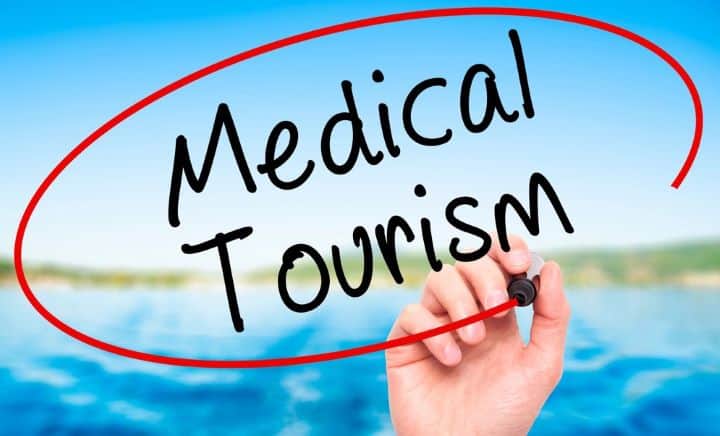
Typically, dental tourists are from developed countries like the US seeking more affordable dental care in developing countries like Mexico and India. Lower living costs in these destinations usually translate to lower medical bills.
Now, who would pass up the opportunity to save a few bucks? Except in this case, it’s not just a few.
Dental tourists can expect cost savings to reach a staggering 70%.
A dental implant of $5,000 in the US can cost as low as $600 in India or $1,200 in Mexico . These cost savings are the primary reason people seek dental services abroad.
Another reason individuals go for dental or health care overseas is because the procedure isn’t available in their home country.
The Growing Popularity of Dental Tourism
Dental tourism has become popular because many people lack dental insurance amid the rising healthcare costs. The US health spending increased by 4.1% in 2022 to $4.4 trillion. It also grew by 4.1% in 2021.
Unwilling to spend hefty amounts on expensive treatments like dental surgery and implants, individuals are seeking more affordable yet quality dental care abroad.
According to Adroit Market Research , the global dental tourism industry is expected to grow by 12% CAGR to reach $5.83 billion by 2025.
Benefits of Dental Tourism
Cost savings.
Dental care in the US is pretty expensive. Dental tourism solves this challenge.
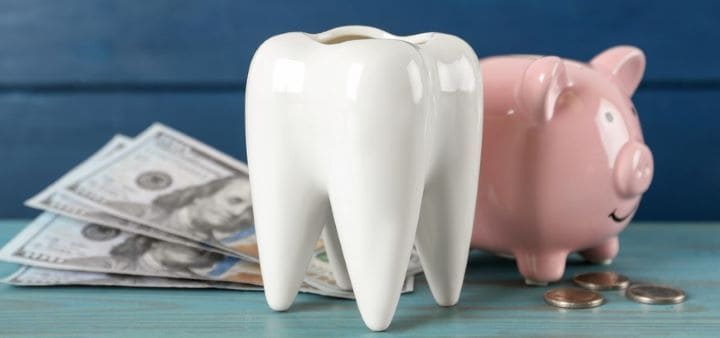
A review by the Washington Post noted an 18% savings that included the dental treatment and entire travel expenses. The procedure alone can save you anything from 40-75%, according to an Ontario Academy of General Dentistry report .
Access to High-Quality Dental Care
That a service is priced lower doesn’t necessarily mean it’s inferior quality. Foreign countries like India and Mexico offer low-cost dental care because:
- Their cost of living is lower (lower overhead expenses and taxes mean dentists can charge relatively smaller fees and still make enough profit)
- Foreign dentists carry little or no student loan debt, unlike US graduates
- There’s more affordable medical malpractice insurance (not required in some countries)
Wealthy citizens of developing nations may also travel abroad for quality dental procedures unavailable in their country.
Opportunity for a Vacation or Travel Experience
You can combine dental care with a vacation, which is a brilliant way to kill two birds with one stone. Explore the Mayan ruins of Mexico as you recover from your treatment before heading home. Perfect if there are follow-up visits.
Risks and Considerations of Dental Tourism
Now, dental tourism isn’t all rosy. You’ll want to know the potential challenges before booking your flight.
Quality and Safety Standards
The safety standards and quality of dental care in foreign countries may differ from those in the United States.
For instance, there are strict sterilization rules in the US governed by OSHA to minimize the risk of infections from dental implants . The FDA also regulates the quality of materials used. This mitigates complications from dental care in the US.
Follow-up Care and Complications
If you require follow-up visits after the treatment, you’d have to remain in the country until it’s over.
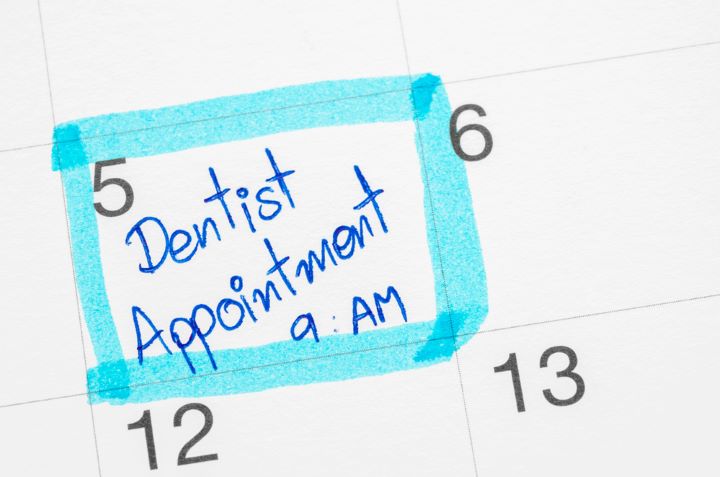
This incurs more lodging and feeding expenses. But that’s even the least worrying part.
What happens when complications arise only after you’ve returned home?
Every medical procedure carries risks, and dental treatments are no exception. Bacteria may get into the dental implant prior to insertion, or the implant may fail after the fact.
However, the symptoms may not manifest immediately.
Of course, complications arising from dental treatments are treatable. The problem is the cost and inconvenience.
You’ll either need to travel back (extra expenses) or spend thousands of dollars at a local dental office. That will inevitably defeat the purpose of your dental vacation.
And because the same high standards of care mandated in the US may not exist in less developed countries, the risk of complications can be pretty significant. But this is more reason to do your research before committing. Notwithstanding, many dental clinics in the top destinations offer dental treatments with the highest safety standards.
Language Barrier
If your chosen dentist speaks little or no English and you can’t speak their language, you may have trouble communicating your needs. Any slight misunderstanding may significantly impact the treatment outcome.
To avoid that, check out various reputable dentists and their English proficiency before committing.
Top Destinations for Dental Tourism
Mexico, Thailand , Hungary, Costa Rica , and India are some of the best countries for dental tourism. A single dental implant costing $5,000 in the US ranges from $600 to $1,200 in these destinations.
When looking for a dental tourism destination, you ideally want to choose one with budget-friendly prices and industry-standard services. An abundance of tourist attractions is a plus. Mexico meets all of these criteria.

The cost of dental work in Mexico is around 70% less than in the United States.
However, the main reason many Americans choose Mexico as their dental destination is its proximity to the US. Those near the border can save more by driving rather than flying.
2. Thailand
Thailand is one of the best dental tourism countries. It’s also the most visited tourist country in Southeast Asia. Aside from the tropical beaches and rich culture, you can save 60-70% of what you’d pay in the US.
The best city to visit for dental tourism in Thailand is Bangkok. The city has world-class dental facilities, plus a vibrant culture and bustling nightlife.
Hungary is a top dental tourist destination for Europeans who don’t wish to travel far. Due to the lower cost of living, you can get quality dental treatment for one-third of what you’ll pay in the US or other wealthy European nations.
Hungary might not be the best choice for Americans due to distance. But if you’ve been yearning to explore the ancient architecture of Budapest, it might be worth it.
4. Costa Rica
Costa Rica is a medical tourism hotspot for Americans and Canadians. Considering its proximity to these countries, it’s easy to see why.
Dental treatments are 60-80% lower in Costa Rica compared to the US. What’s more, tourists get the chance to explore tropical rainforests, active volcanoes, and pristine beaches after the procedure.
India was named the best destination for dental tourism in 2020.
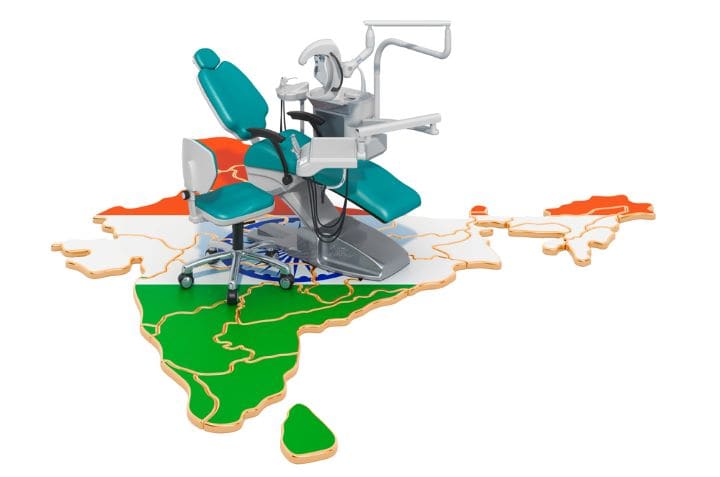
Americans can save about 70-80% on dental care by visiting India. But cost isn’t the only reason India is arguably the best place for dental travel.
Many dental professionals in India have international accreditation and affiliation with US hospitals. Also, you’ll have almost no trouble finding an English-speaking dentist in India. That’s because India has the largest English-speaking population after the USA.
Dental Procedures Commonly Sought Through Dental Tourism
Dental tourism can involve major work, including the following:
- Dental implants : Dental implants are used to replace missing teeth with natural-looking results. They’re costly in the US, prompting residents to travel abroad.
- Cosmetic dentistry : Most dental work abroad is focused on cosmetic dentistry . Treatments include teeth whitening, veneers , or smile makeovers.
- Orthodontic treatments : Orthodontic treatments like braces and aligners are also a common reason for medical tourism as they’re cheaper abroad.
- Oral surgeries : If you’ve been diagnosed with a condition requiring procedures like wisdom teeth removal, root canals, or gum surgeries but face financial challenges, dental treatment abroad can be an excellent solution.
How to Plan a Dental Tourism Trip
Research and choose a destination.
Curate a shortlist of popular destinations for dental tourists. Consider the distance, flight cost, and quality of infrastructure in your shortlisted countries.
If you live in the United States, Mexico and Costa Rica may be more convenient. But a UK resident may prefer Hungary.
The CDC advises thoroughly researching medications, infection control, and antibiotic-resistant bacteria before traveling for dental care. You also want to identify the standards by which clinics in the country are held before healthcare organizations accredit them.
If something goes wrong, you’ll want to know what options are available to obtain restitution, retreatment, or refunds.
Find a Reputable Dental Clinic Abroad
While seeking affordable dental care abroad, don’t be too obsessed with cost savings to the point of choosing the cheapest clinic. The top clinics in a country like Mexico or Colombia will still be far more affordable than an average one in America.
Cost aside, don’t trust whatever you find on a clinic’s website.
Check reviews on Google, not the clinic’s website. It’s also best to consult with the dentist and request their résumé.
This can allow you to personally evaluate their educational background and experience. Plus, you get the chance to gauge the dentist’s English proficiency.
Working with a dentist who’s an American Dental Association (ADA) member can give you some sense of safety. Some dental practices in Mexico and Costa Rica have US licenses and are on par with ADA and CDA standards.
That said, patients going for dental and medical tourism are generally advised to work with consultants like Patients Beyond Borders. These consultants will do the background check on your behalf. Based on their industry experience, they can also help recommend the best clinics.
Make Travel Arrangements and Accommodations
Once you’ve chosen a destination and a dentist, you can go ahead and book your flight. You’ll want to find comfortable accommodation close to the clinic.

While no country is 100% safe, research what security risks and diseases may be expected in that environment.
A dental tourism company can help make arrangements for accommodation and transportation.
Preparing for the Dental Procedure and Post-Treatment Care
Follow all pre-treatment instructions provided by the dentist. These may include fasting or abstaining from some activities before the procedure.
Your dentist will also provide post-treatment instructions. It’s wise to adhere strictly to every instruction, as it will facilitate your healing process.
While recovering, you can use the time to explore the tourist attractions in the location. And watch out for symptoms of complications.
It’s worth stating that scheduling your post-treatment care with your local dentist is fine. Just be sure to forward them your foreign dental records. By so doing, they’ll be abreast of your dental history.
After all’s said and done, ongoing oral hygiene is key to lasting dental health.
Tips for a Successful Dental Tourism Experience
Understand the local culture and customs.
Simple gestures like greeting the locals in the local language can enhance your interactions with them. Moreover, there may be cultural norms such as clothing items or phrases deemed inappropriate. Awareness of these norms makes your stay much smoother, enhancing your dental tourism experience.
So, again, do your research.
Communicate Effectively with the Dental Clinic
Ensure clarity regarding your concerns, treatment plan, and appointment scheduling before having your dental work done.
Know how long the treatment and follow-ups are expected to take so you can plan accordingly.
Know What to Expect During the Dental Procedure
Research the process, the downtime required, whether it’s painful, and potential outcomes. With this awareness, there’s less risk of unpleasant surprises down the road.
Seek Assistance from Dental Tourism Agencies
One way to enhance your dental tourism experience is to leave the planning to a reputable dental tourism agency or facilitator.

These professionals specialize in coordinating dental treatment abroad. They’ll organize travel arrangements, accommodation bookings, and a list of trusted dentists in the country.
They do the hard work so you don’t have to.
As you can see, dental tourism is an excellent option for anyone looking to save costs on expensive dental treatments. However, the country and clinic you choose can significantly impact your experience.
So, research thoroughly.
Ask yourself: do the cost savings outweigh the potential inconveniences?
It’s also helpful to discuss with your local dentist to know the options available to save costs in your country.
Frequently Asked Questions (FAQs)
Is it worth traveling abroad for dental work.
Yes, the lower cost makes receiving dental care in another country worth considering. The procedure plus entire travel expenses may cost 18% less than the same procedure alone in the US. But you also need to consider the drawbacks.
Which country is the cheapest for dental implants?
Mexico, Costa Rica, and India offer the lowest prices for dental implants. The best destination is usually the one that saves you time and money. Due to its proximity, Mexico can be ideal for Americans.
What are the pros and cons of dental tourism?
The major benefit of dental tourism is cost savings. The drawback is the potential risks, such as travel inconveniences and complications arising after arriving in your home country.
What payment methods do foreign dental clinics accept?
Most reputable dental clinics abroad accept major credit cards like Visa and Mastercard. Some also accept debit cards. This allows you to pay for your dental treatments using your preferred option.
Related Posts
- Dentist Without Insurance: Getting Free or Low-Cost Dental Care
- Dental Tourism in Costa Rica: Quality Care, Cost Savings, and Memorable Travel Experiences
- Dental Implants: Types, Procedures, Costs, Pros and Cons
- Dental Tourism in Colombia: Get Affordable Quality Dental Work in Colombia
- Dental Tourism in Hungary: A Guide to Cost-Effective Dental Work
- Dental Tourism in India: Affordable Dental Work And Dental Vacation
- Dental Tourism in Thailand: Quality Dental Treatments At Affordable Prices
- Dental Tourism in Mexico: Getting Cost-Effective Quality Dental Work

Ava is a content writer and Copywriter. She writes about a variety of topics, including dentistry. When needed, her articles are reviewed by dentists affiliated with DentalCenter.com for medical accuracy. When she’s not drumming her fingers on her keyboard, she enjoys reading or watching movies.
Latest Articles:

Best Foods to Eat After Dental Implant Surgery. And What to Avoid

Fruits and Vegetables: The Best-Kept Secret to Strong Teeth and Gums

Peri-Implantitis: Causes, Symptoms, and Treatment Options Explained
Sign up for our newsletters.
The best of dental tips and news, in your inbox.

The Pitfalls of Dental Tourism: Proceed with Caution
Wellspring dental.
In recent years, dental tourism has emerged as a tempting option for individuals seeking affordable dental care or specialized procedures. However, beneath the surface allure of cost savings and exotic destinations lie a multitude of risks and considerations that warrant careful attention. Let’s delve into the potential pitfalls of dental tourism and why proceeding with caution is crucial.
Quality Compromises: One of the most significant concerns associated with dental tourism is the compromise in quality of care. While the promise of lower prices may seem enticing, it often comes at the expense of standardized practices and regulations that ensure patient safety and well-being. Dental clinics in foreign countries may not adhere to the same rigorous standards as those in your home country, leading to subpar treatment outcomes and increased risks of complications.
Limited Recourse for Complications: In the event of post-treatment complications or dissatisfaction with the results, dental tourists face significant challenges in seeking recourse or follow-up care. Language barriers, cultural differences, and logistical hurdles can hinder effective communication with dental providers abroad, leaving patients feeling stranded and helpless in navigating their dental journey.
Unforeseen Costs and Hidden Expenses: While dental tourism initially appears as a cost-effective solution, the reality often paints a different picture. Additional expenses such as travel accommodations, transportation, and unforeseen medical costs in the event of complications can quickly add up, eroding the perceived savings and potentially surpassing the cost of treatment in your home country.
Risk of Inadequate Screening and Diagnosis: The rush to capitalize on the booming dental tourism industry may lead to inadequate screening and diagnosis of dental conditions. Rushed consultations and limited access to comprehensive medical histories may result in misdiagnosis or oversight of underlying oral health issues, jeopardizing the effectiveness and safety of treatment.
Ethical Concerns and Exploitative Practices: Dental tourism can also raise ethical concerns regarding exploitative practices and the commodification of healthcare. In some cases, clinics may prioritize profit over patient well-being, leading to unnecessary procedures or aggressive marketing tactics that prey on vulnerable individuals seeking affordable treatment options.
Considerations for Informed Decision-Making: Before succumbing to the allure of dental tourism, it’s essential to weigh the potential risks against the perceived benefits and consider alternative options for accessing dental care. Seeking recommendations from trusted local dentists, exploring financing options, and thoroughly researching prospective dental providers can help mitigate the inherent risks associated with dental tourism.
Conclusion: While dental tourism may offer a temporary escape to exotic locales and seemingly affordable treatment options, the long-term consequences and inherent risks far outweigh the immediate benefits. Proceeding with caution, conducting thorough research, and prioritizing patient safety and quality of care are paramount in navigating the complex landscape of dental tourism. Ultimately, the decision to embark on a dental tourism journey should be made with careful consideration and informed awareness of the potential pitfalls that lie ahead.
View More Blog Posts
A day in the life of your teeth: what really happens from morning to night.
Your teeth work tirelessly from morning until night, playing a crucial role in your daily routine. But have you ever wondered what a typical day
Sleep Apnea and Dental Health: The Overlooked Connection
Sleep apnea is a common but often overlooked condition that affects millions of people worldwide. Characterized by repeated interruptions in breathing during sleep, sleep apnea
Thanks for visiting! GoodRx is not available outside of the United States. If you are trying to access this site from the United States and believe you have received this message in error, please reach out to [email protected] and let us know.

Dental tourism: things to consider before going that extra mile for your smile
NHMRC Sidney Sax Research Fellow, University of Sydney
Lecturer in Dental Ethics, Law and Professionalism, University of Sydney
Disclosure statement
Madhan Balasubramanian receives funding support from the Australian Government National Health and Medical Research Council (NHMRC) Sidney Sax Research Fellowship (GNT1121576). In addition to his academic appointment at the University of Sydney, he holds visiting research fellow appointments at the University of Adelaide and Kings College London. He is also an Associate Fellow of the Australasian College of Health Services Management. The views are entirely of the authors and do not represent the views of NHMRC.
Alexander Holden works as a dentist in general practice in addition to his listed academic appointment. He is also an Associate of Sydney Health Ethics. Alexander is also a Federal Councillor of the Australian Dental Association.
University of Sydney provides funding as a member of The Conversation AU.
View all partners
Australians spend up to A$300 million each year on health-care costs abroad. As part of this phenomenon, each year around 15,000 of us are travelling overseas for cosmetic surgery tourism, including dental procedures.
We don’t have firm numbers on exactly how much Australians spend on dental procedures. But we know for sure dental implants , crowns and bridges (prosthetic devices implanted to cover a damaged tooth or missing teeth), endodontics (such as root canal treatments) and other cosmetic dental procedures are becoming highly desirable.
There has never been more pressure to have a straight, bright and white set of teeth.
Read more: 50 shades whiter: what you should know about teeth whitening
The rise of dental tourism
Health-care tourism refers to people travelling overseas to undergo a medical or dental procedure. People travel for a range of dental procedures including having implants, crowns and bridges fitted, or for dentures, root canal treatment, fillings, veneers and teeth whitening.
In Australia, three in ten people have avoided visiting a dentist due to cost, while one in five were unable to afford treatment recommended by a dentist. Dental care in Australia is not subsidised for the majority of Australians, and about half don’t have any private dental insurance, which makes the allure of dental tourism clear.
Some companies offer all-inclusive packages for sun, sea and smiles , meaning you can receive dental care as part of your holiday.
Dental treatment abroad including flights and luxury hotel accommodation is often still cheaper than some dental treatments at home. For Australians, the most popular destinations are countries in Southeast Asia such as Thailand, Indonesia, Malaysia and the Philippines.
Patients who travel tend to be ordinary people with modest incomes . And, like medical tourism, a substantial part of overseas dental travel involves diaspora patients returning to their home country for more familiar (and cheaper) care.
Read more: Medical tourism: having an op overseas adds to the everyday risk of surgery
What are the risks?
Dentistry, whether provided at home or abroad, is never risk-free. You might pay top dollar to see the best provider and still have something go wrong.
The Australian Dental Association advocates for patients to reconsider mixing holidays abroad with their oral health care. The association says the standards of dentistry overseas aren’t as good as in Australia and there could be issues with cleanliness and infection risk.
While there are no strong population-based studies that prove overseas dental treatment leads to poor outcomes, case studies do exist. These have shown lack of accountability and regulation are the main issues with dental tourism, particularly when complications arise.
Education, training and practice philosophies of overseas-trained dentists might be different to those of Australian-trained dentists. Dental education systems in a few major tourist destinations in Southeast Asia and the Indian subcontinent are facing several challenges in terms of rapid privatisation, quality and regulation.
On the other side on the coin, Australia has also had reported cases of poor infection control practices.

Things to consider
Whether you choose to have dental treatment overseas or in Australia, here are some things to consider:
Have you had enough time to think about your treatment? If you have a plane to catch and a tight schedule, you need to be wary about being pressured into committing to treatments before you feel ready. Holidays come and go but the effects of dental treatment stick around for a lot longer.
Have you been able to ask questions? Most dentists are really good at telling patients about treatments and different options. If you don’t feel you can ask questions, or that you are getting answers that satisfy your needs, you should be able to have a second opinion. Don’t be afraid to ask for one.
What happens if things don’t work out? Dentistry is as much of an art as it is a science. No matter how skilled your dentist, sometimes things don’t go to plan or are more complex than first thought. It usually isn’t too much of a problem to put things right, but if you need to see a dentist again, is this going to be difficult?
From dental tourism to transnational dental care
In this era of globalisation, overseas travel for dental care seems unavoidable. On a positive note, increased international flows of patients are likely to stimulate debate and develop solutions to enable more effective and cheaper access to dental care in Australia.
Host countries that benefit from dental tourism and have modified their clinical facilities for an international clientele may be encouraged to offer similar levels of quality care to local patients.
Read more: How to fill the gaps in Australia's dental health system
Professional and patient regulation and other mechanisms (such as insurance) that are preserved for national interests will need to widen to include the concerns of overseas health-care travellers.
Regional cooperation across countries where dental tourism occurs will need to be actively pursued. This includes streamlined support for understanding dental tourism such as the inflows and outflows of patients, types of treatments, care providers and after care. Better data on dental tourism are vital for tracing and explaining this phenomenon.
- Health care
- Dental care

Administration and Events Assistant

Head of Evidence to Action

Supply Chain - Assistant/Associate Professor (Tenure-Track)

OzGrav Postdoctoral Research Fellow

Casual Facilitator: GERRIC Student Programs - Arts, Design and Architecture
Our Response to COVID-19 →
Medical Tourism
Understanding the risks and rewards of dental tourism.
In recent years, dental tourism has emerged as a significant segment of the broader medical tourism industry. Attracting patients worldwide, it offers the allure of combining dental care with the opportunity to visit new destinations. However, like any medical procedure, especially when undertaken abroad, it comes with its own set of risks and rewards. This article aims to provide a detailed overview for industry professionals to understand the nuances of dental tourism.
The Allure of Dental Tourism
Cost-Effectiveness: One of the primary drivers of dental tourism is the potential for significant cost savings. Patients can often receive high-quality dental care at a fraction of the cost they would pay in their home countries. This is particularly appealing for procedures that are not covered by insurance, such as cosmetic dentistry.
Access to Specialized Care: Some countries are renowned for their specialization in certain dental procedures. Patients often seek care abroad to benefit from these specialized services, which might not be readily available or as advanced in their home country.
Combining Treatment with Travel: Dental tourism allows individuals to combine their dental care with the opportunity to travel. It is particularly appealing for those who wish to make the most of their time abroad by experiencing new cultures and destinations.
Risks Associated with Dental Tourism
Quality and Standards of Care: One of the biggest concerns is the variance in quality and standards of care between countries. Not all destinations may have the same stringent regulatory environments, potentially leading to lower standards of healthcare.
Communication Barriers: Language differences can pose significant challenges, potentially leading to misunderstandings about the treatment, aftercare, or risks involved.
Continuity of Care: Post-treatment follow-up can be complicated when the dentist is in another country. If complications arise, local dentists might be unfamiliar with the techniques or materials used.
Legal and Ethical Implications: Patients may face challenges with legal recourse in cases of malpractice or unsatisfactory outcomes. The legal frameworks governing medical liability can vary significantly between countries.
Mitigating the Risks
Research and Due Diligence: It is crucial for patients to thoroughly research and verify the credentials, reputation, and reviews of the dental care providers and the facilities where they plan to receive treatment.
Understanding the Full Costs: While the initial cost of the dental procedure might be lower, patients should consider additional expenses such as travel, accommodation, and potential follow-up treatments.
Insurance and Coverage: Patients should investigate whether their insurance provides coverage for dental procedures performed abroad and understand the limitations and conditions of such coverage.
Emergency Preparedness: Having a contingency plan in case of medical emergencies or complications is essential. Patients should be aware of the healthcare infrastructure in the destination country.
Benefits Beyond Cost Savings
Cultural Experience: Dental tourism offers the unique opportunity to explore new destinations and cultures, enriching the overall experience beyond just receiving medical care.
Access to Innovative Treatments: Some countries might offer access to the latest dental technologies and treatments that are not yet available in the patient’s home country.
Personalized Care: Many dental tourism destinations are known for providing more personalized care, with shorter wait times and more one-on-one attention from medical staff.
Dental tourism presents a complex but potentially rewarding option for patients seeking dental care. While the cost savings and the opportunity for travel are attractive, it is imperative to weigh these benefits against the potential risks and challenges. By conducting thorough research and taking necessary precautions, dental tourists can make informed decisions to ensure a safe and satisfying experience. For industry professionals, understanding these factors is crucial in guiding and advising patients considering dental tourism as an option.
To receive a free quote for this procedure please click on the link: https://www.medicaltourism.com/get-a-quote
For those seeking medical care abroad, we highly recommend hospitals and clinics who have been accredited by Global Healthcare Accreditation (GHA). With a strong emphasis on exceptional patient experience, GHA accredited facilities are attuned to your cultural, linguistic, and individual needs, ensuring you feel understood and cared for. They adhere to the highest standards, putting patient safety and satisfaction at the forefront. Explore the world's top GHA-accredited facilities here . Trust us, your health journey deserves the best.
Top Metabolic Surgery Specialists in Antigua and Barbuda
Una guía integral de los mejores hospitales para cirugía metabólica en la república dominicana, leading centers for digestive health procedures, best hospitals for cyberknife radiosurgery in turkey, jeddah's premier hospital for thoracic surgery: a comprehensive review, gestación subrogada y resolución de disputas: navegando conflictos entre las partes, gestación subrogada y preocupaciones éticas, gestación subrogada y parejas con creencias religiosas, gestación subrogada y padres solteros: un camino hacia la paternidad, continue reading, featured reading, certified medical tourism professional (cmtp): bridging the medical tourism training gap, cultural competency and the medical travel patient experience, medical tourism magazine.
The Medical Tourism Magazine (MTM), known as the “voice” of the medical tourism industry, provides members and key industry experts with the opportunity to share important developments, initiatives, themes, topics and trends that make the medical tourism industry the booming market it is today.
Thank you for visiting nature.com. You are using a browser version with limited support for CSS. To obtain the best experience, we recommend you use a more up to date browser (or turn off compatibility mode in Internet Explorer). In the meantime, to ensure continued support, we are displaying the site without styles and JavaScript.
- View all journals
- Explore content
- About the journal
- Publish with us
- Sign up for alerts
- Published: 07 October 2019
Implications of dental tourism Examining US patients travelling to Mexico for dental care
- Rosalind Garner 1
BDJ In Practice volume 32 , pages 20–23 ( 2019 ) Cite this article
21 Accesses
1 Citations
Metrics details
This narrative literature review aims to condense key themes on the implications of dental tourism. The review focuses specifically on US patients travelling to Mexico for care and explores the ethical and economic effects this has on both the practise of dentistry and more broadly on the destination and departure countries.
When discussing the implications of dental tourism, the focus of the patient, practitioner and academics hitherto largely centres on the implications for the patient of travelling abroad. Such implications include the lack of the same legal redress for malpractice that patients would have received domestically 1 or concerns over the quality of care. 2
This is a preview of subscription content, access via your institution
Access options
Subscribe to this journal
We are sorry, but there is no personal subscription option available for your country.
Buy this article
- Purchase on SpringerLink
- Instant access to full article PDF
Prices may be subject to local taxes which are calculated during checkout
Turner L. First world health care at third world prices: globalization, bioethics and medical tourism. BioSocieties 2007; 2: 303-325.
California Dental Association. Dental Tourism. Available from: https://www.cda.org/Portals/0/pdfs/fact_sheets/dental_tourism_english.pdf (Accessed September 2019).
Dhama K et al. Global tourist guide to oral care - A systematic review. J Clin Diagn Res 2016; 10: ZE01-04.
Kovacs E, Szocska G. 'Vacation for your teeth: Dental tourists in Hungary from the perspective of Hungarian dentists'. Br Dent J 2013; 215: 415-418.
Osterle A, Balaz P, Delgado J. Travelling for teeth: characteristics and perspectives of dental care tourism in Hungary. Br Dent J 2009; 206: 425-428.
Zoltan J, Maggi R. What is tourism in dental tourism? TTRA Europe Conference Proceedings. 2010: 11-13.
American Dental Association. Statement on Dental Tourism-Ethical Obligations of Dentists. Available from: www.ADA.org (Accessed September 2019).
Kamath K, Hugar S, Kumar V, Gokhale N, Uppin C, Hugar S S. The business and pleasure of teeth: Dental tourism Int J Contemp Dent Clin Med Rev 2015; Article ID: 010715.
Kangas B. Travelling for medical care in a global world. Medical Anthropology 2010; 29: 344-362.
Patients Beyond Borders. Medical tourism statistics and facts. Available from: https://patientsbeyondborders.com/medical-tourism-statistics-facts (Accessed September 2019).
World Health Organisation. Oral Health. Available from: https://www.who.int/news-room/fact-sheets/detail/oral-health (Accessed September 2019).
World Health Organisation. Equity, social determinants and public health programmes. Available from: https://apps.who.int/iris/handle/10665/44289 (Accessed September 2019).
Medical Tourism Corporation. Dental Tourism in Mexico - A Vacation with the Best Dentists. Available from: https://www.medicaltourismco.com/dental-tourism-mexico/ (Accessed September 2019).
Center for Health Care Strategies, Inc. Medicaid Adult Dental Benefits: An Overview. Available from: www.chcs.org/media/Adult-Oral-Health-Fact-Sheet_112118.pdf (Accessed September 2019).
OECD. Health at a Glance 2013: OECD indicators. Available from: www.oecd.org/els/health-systems/Health-at-a-Glance-2013.pdf (Accessed September 2019).
Meghani Z. A robust, particularist ethical assessment of medical tourism. Dev World Bioeth 2011; 11: 16-29.
Dalen J E and Alpert J S. Medical Tourists: Incoming and Outgoing. Am J Med 2019 132: 9-10.
National Association of Dental Plans. Dental Benefits Report: Enrolment. Available from: https://knowledge.nadp.org/products/2017-dental-benefits-report-enrollment (Accessed September 2019).
American Dental Association. Oral Health and Well-Being in the United States. Available from: https://www.ada.org/~/media/ADA/Science%20and%20Research/HPI/OralHealthWell-Being-StateFacts/US-Oral-Health-Well-Being.pdf?la=en (Accessed September 2019).
Laugesen M J and Vargas-Bustamante A. A patient mobility framework that travels: European and United States-Mexican comparisons. Health Policy , 2010; 97: 2-3.
Adams K, Snyder J, Crooks V A and Berry N S. 'Stay cool, sell stuff cheap, and smile': Examining how reputational management of dental tourism reinforces structural oppression in Los Algodones, Mexico. Soc Sci Med 2017; 190: 157-164.
NPR. A Reason to Smile: Mexican Town is a Destination For Dental Tourism. Available from: www.npr.org/sections/health-shots/2014/06/09/318212444/a-reason-to-smile-mexican-town-is-a-destination-for-dental-tourism?t=1561977470060 (Accessed September 2019).
Dalstrom M D. Winter Texans and the Re-creation of the American Medical Experience in Mexico. Med Anthropol 2012; 31: 162-177.
Infodent International. Focus on: The Mexican Dental Industry. Available from: www.gnydm.com/uploads/files/focus-on-Mexico.pdf (Accessed September 2019).
Organisation for Economic Co-operation and Development. Health Care Resources: Dentists. Available from: https://www.patientsbeyondborders.com/ (Accessed September 2019).
American Dental Association. Supply of Dentists in the US: 2001-2018. Available from: https://www.ada.org/en/science-research/health-policy-institute/data-center/supply-and-profile-of-dentists (Accessed September 2019).
World Health Organisation. Density of dentists (total number per 10,000 population, latest available year. Available from: www.who.int/gho/health_workforce/dentists_density/en/ (Accessed September 2019).
Adams K, Snyder J, Crooks V A and Berry N S. A critical examination of empowerment discourse in medical tourism: the case of the dental tourism industry in Los Algodones, Mexico. Global Health 2018; 14: 70.
Irigoyen M E, Luengas I F, Yashine A, Mejia A M and Maupomé G. Dental caries experience in Mexican schoolchildren from rural and urban communities. Int Dent J 2000; 50: 41-45.
Judkins G. Persistence of the US-Mexico Border: expansion of medical-tourism amid trade liberalisation. J Latin Am Geo 2007; 6: 11-32.
Guay A H. The differences between dental and medical care - implications for dental benefit plan design. J Am Dent Assoc 2006; 137: 801-806.
Sobo E J, Herlihy E and Bicker M. Selling medical travel to US patient-consumers: The cultural appeal of website marketing messages. Anthropol Med 2011; 18: 119-136.
Turner L. 'Dental tourism': Issues surrounding Cross-Border travel for dental care. J Can Dent Assoc 2009; 75: 117-119.
York D. Medical tourism: The trend toward outsourcing medical procedures to foreign countries. J Cont Educ Health Prof 2008; 28: 99-102.
Johnston R, Crooks V A, Snyder J and Kingsbury P. What is known about the effects of medical tourism in destination and departure countries? A scoping review. Int J Equity Health 2010; 9: 24.
Said E. Orientalism: Western Conceptions of the Orient. London: Penguin: 1977.
Download references
Author information
Authors and affiliations.
King´s College London, Guy´s Tower, Guy´s Hospital, Great Maze Pond, SE1 1UL, London, UK
Rosalind Garner
You can also search for this author in PubMed Google Scholar
Corresponding author
Correspondence to Rosalind Garner .
Rights and permissions
Reprints and permissions
About this article
Cite this article.
Garner, R. Implications of dental tourism Examining US patients travelling to Mexico for dental care. BDJ In Pract 32 , 20–23 (2019). https://doi.org/10.1038/s41404-019-0182-5
Download citation
Published : 07 October 2019
Issue Date : October 2019
DOI : https://doi.org/10.1038/s41404-019-0182-5
Share this article
Anyone you share the following link with will be able to read this content:
Sorry, a shareable link is not currently available for this article.
Provided by the Springer Nature SharedIt content-sharing initiative
Quick links
- Explore articles by subject
- Guide to authors
- Editorial policies
- Our Practice
- Meet the Team
- Before & After
- $49 New Patient Special
Our Services
- Cosmetic Dentistry
- General Dentistry
- Specialty Dentistry
- Preventative Care
- Emergency Dentistry
- Your First Visit
- Patient Resources
- Payment Plans
- 978.422.1006
- Email Us | Pay Bill
- Book Online

2 Beverly Drive, Suite 1 | Sterling, MA 01564 | 978.422.1006
The Dangers of Dental Tourism: What You Need to Know
When someone needs cosmetic dentistry near Leominster often they will look for a dentist near them that matches their criteria. Some people, however, travel to other countries for cosmetic dentistry, thinking it would save them some money. Let’s explore why someone might want to choose the more expensive option of choosing a dentist near them instead of going to a cheaper country for dentistry. You might find that some dental tourism practitioners don’t just cut costs, but also corners.
Quality of Dental Care
One of the primary concerns with dental tourism is the variability in the quality of care. While many countries have world-class dental professionals, others might not have the same rigorous training and licensing standards as your home country.
- Licensing and Credentials : Not all countries have strict regulations and oversight for dental professionals. This can make it challenging to verify a dentist’s qualifications and experience.
- Hygiene and Sterilization : Standards for clinic cleanliness and equipment sterilization may differ. Inadequate hygiene can lead to infections or other complications.
Communication Barriers
Language barriers can lead to misunderstandings about the procedure, aftercare, and potential risks. Clear communication is crucial in medical settings, and any miscommunication can lead to unfavorable outcomes.
Legal Recourse
If something goes wrong during or after a dental procedure abroad, seeking legal recourse can be challenging. The laws and regulations governing malpractice might be different, making it difficult, if not impossible, to file a lawsuit or claim compensation. Additionally, many people you will encounter during legal proceedings will be speaking the native language as opposed to English.
Travel-Related Risks
Traveling after a dental procedure, especially major ones, can increase the risk of complications. The stress of travel, potential exposure to different bacteria and viruses, and even the act of flying (changes in cabin pressure) can negatively impact healing.
Lack of Follow-Up Care
Proper aftercare is essential for any dental procedure. When you return home, your local dentist in Leominster might be hesitant or unfamiliar with the techniques used abroad. This can lead to challenges in receiving appropriate follow-up care, addressing complications, or even routine maintenance.
Hidden Costs
While the initial cost of the procedure might be lower abroad, there can be hidden expenses. These can include travel costs, accommodations, potential return trips for follow-ups, and any treatments required to address complications. Unfortunately complications from dental tourism might be higher than you think, with a survey done by the BDA finding that 86% of dentists have had to deal with a complication with dental work done abroad.
While dental tourism can offer cost savings and the allure of combining medical procedures with travel, it’s essential to weigh the potential risks. It’s probably best to go to a local dentist for any dental needs you may have. If you are looking for a cosmetic dentist near Leominster to talk to before deciding if you should go abroad for dental care, we recommend you speak to one of our dentists first.
Posted by: Sterling Dental Group
Recent Posts
- Fixing Decayed or Broken Teeth Near Leominster
- Moving to Leominster and Need a New Dentist? Welcome to Our Dental Office
- Dentist Near Leominster Reveals Counterintuitive Method of Saving Money On Dentistry
- Dentist Near Leominster That is In-network with Altus
- Could Lack of Access to Fresh, Healthy Foods in Sterling and Princeton Impact Oral Health?
- Dental Health
- Dental Implants
- Dental Insurance
- Dental Tips
- Local Dentistry
- Pediatric Dentistry
- Second Opinion
- Senior Dentistry
- Uncategorized
- Women in Dentistry
- February 2024
- January 2024
- December 2023
- November 2023
- October 2023
- September 2023
- August 2023
- February 2023
- January 2023
- December 2022
- November 2022
- September 2022
- August 2022
- February 2022
- November 2021
- October 2021
- September 2021
- August 2021
- February 2021
- August 2020
- February 2020
- January 2020
- December 2019
- November 2019
- October 2019
- September 2019
- August 2019
- February 2019
- January 2019
- December 2018
- November 2018
- October 2018
- September 2018
- August 2018
- February 2018
- January 2018
- December 2017
- November 2017
- October 2017
- September 2017
- August 2017
- February 2017
- January 2017
- December 2016
- November 2016
- October 2016
- September 2016
- August 2016
- December 2015
All Services in One Location
2 Beverly Drive, Suite 1 | Sterling , MA 01564 | 978.422.1006
Terms and Conditions
Here at Sterling Dental Group, we work diligently to protect our patient's rights and privacy. Requesting an appointment via our Internet portal is considered part of what HIPAA has identified as electronically protected information (ePHI). Unfortunately, despite the best efforts we make or take, there are people or entities that may attempt to intercept the data you transmit to us. By checking the box, and electronically making an appointment, you understand that you are making an appointment over the internet and that Sterling Dental Group will keep this information confidential but cannot guarantee that others, outside of our practice, may not illegally intercept this communication. As a result of continuing, you are sending this transmission and accepting the inherent risk(s) associated with making this request for an appointment. As an alternative, you are always welcome to contact our office via telephone to schedule your appointment.
The information presented here is not intended or implied to be medical advice, diagnosis, or treatment. It should be used for informational purposes only.
Call Us: (773) 736-5300
5 Dangers of Dental Tourism
By Dr. Daniel Dohnalek, DDS
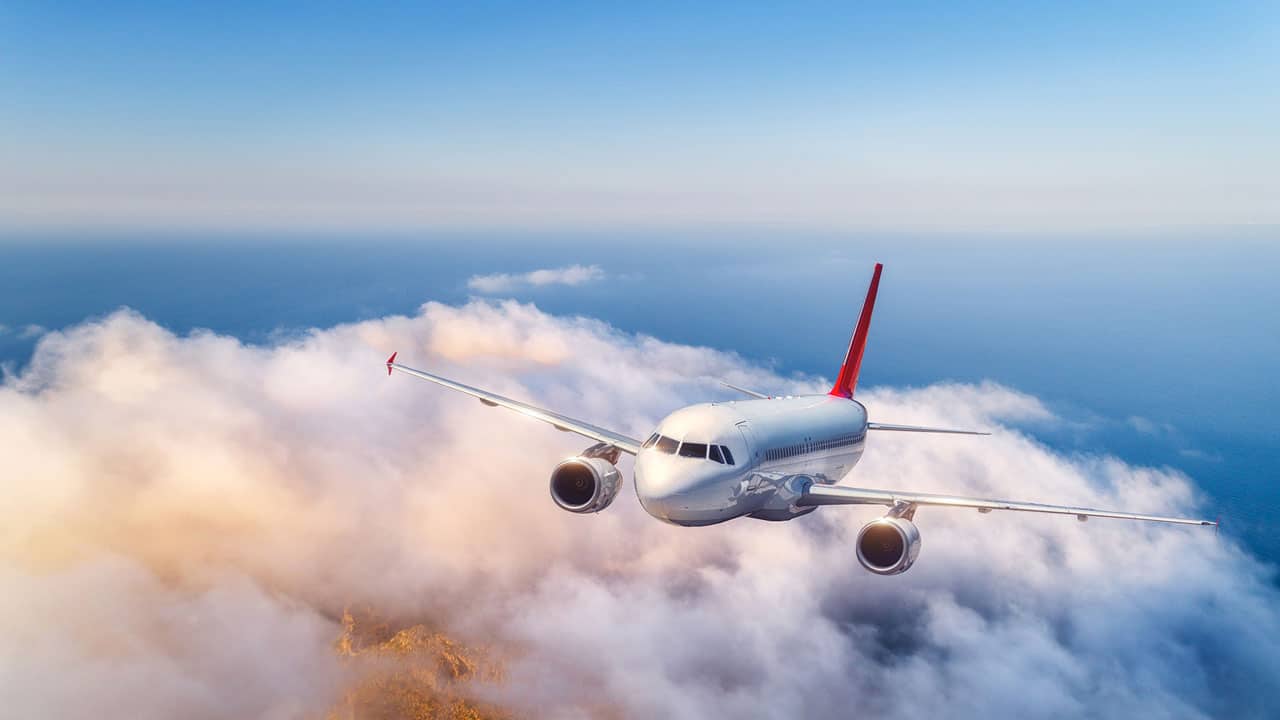
1. There may be little to no regulation whatsoever.
2. recovering can be complicated., 3. you’ll be exposed to different germs and bacteria., 4. your dentist will be going in blind..
Have a general question or comment? Feel free to send us a message! If you have a detailed question or need to make an emergency appointment, please call our office. Se habla Español.
- Patient Name *
- Phone Number *
- Email Address *
- New / Existing Patient New / Existing Patient * New Patient Existing Patient
- Message (Optional)
Schedule An Appointment
- Are you looking for a routine dental cleaning? * Select Yes No
- Full Patient Name *
- New / Existing Patient * New / Existing Patient * New Patient Existing Patient

Appointment Request
Consultation request.
Risks of dental tourism – chronic pain and other complications

What to tell patients
Many patients are obsessed with having a perfect smile and are willing to invest significant amounts of money in dazzling white and straight teeth. On the one hand, this is good because such patients bring in good income. However, many patients are not willing to pay the full price for veneers and instead use the services of “dental tourism.” This can actually turn out to be a good deal for the patient. However, doctors from Mexico and other countries often do not take any responsibility if complications arise. As a result, you may have to see your dentist as an emergency to address the consequences. This is very expensive, and not all problems can be completely eliminated. Today, we will discuss the most common types of complications after the installation of veneers or implants that you need to warn your patients about.
Let’s start with the least risky aspects of using veneers:
- Aesthetics: The unnaturally white color of teeth. Some people are initially delighted with the “Hollywood” whiteness, but very soon they notice that porcelain whiteness has a rather repulsive effect, and the fashion for bright white teeth quickly fades. The natural healthy color of teeth has a slightly yellowish tint. The yellowness comes from dentin, which shows through the white enamel. Warn patients about this, because the estimated service life of porcelain veneers is at least 10 years, and changing them after a year or two is very expensive and traumatic.

Teeth prepared for veneers (shark smile)
- Chronic gum inflammation: Most often, this problem occurs when the veneers are not perfectly fitted, leaving a gap between the veneer and the tooth in the area of contact with the soft tissues. Plaque and food debris accumulate in these irregularities and cavities. The active development of bacteria in this nutrient medium causes irritation and inflammation of the gums. Fixing this problem is quite difficult and expensive, and there are no guarantees. Less commonly, an allergic reaction to the materials from which the veneers are made or to the composition of the adhesive used to fix the veneers occurs. While in clinics in Europe and the USA, materials are tested for allergic reactions, in Mexico or Brazil almost no one does this.
- Introducing local or systemic infection during tooth preparation: This is a very serious problem and can be fatal in cases of antibiotic-resistant infections. This is perhaps the worst thing that can happen, and the risk in unverified clinics only grows.
Only implant-supported dentures can radically and permanently solve the problem of edentia. However, even installing a single implant with a crown in the USA is quite expensive. Given the strong psychological and physiological discomfort, patients look for any way to solve this problem. Many people decide to go abroad for treatment, where such a service costs several times less. But again, there is a high risk of encountering problems, even if you find a good clinic. Let’s look at some of the issues our patients have encountered, starting with the least dangerous ones.
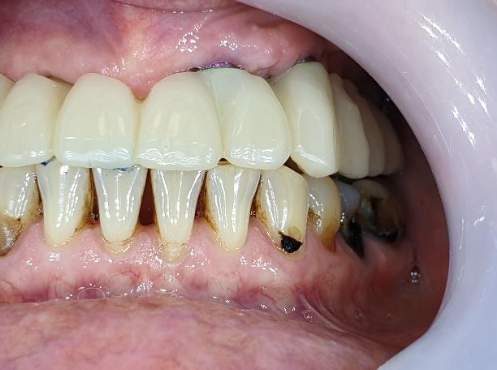
- Difficult hygiene and inflammation of soft tissues: This problem occurs if the prosthesis is poorly manufactured and adjusted relative to the soft tissues of the patient. Food debris gets under the prosthesis, which is difficult to remove, and pathogenic microorganisms actively grow and develop there. As a result, soft tissue irritation occurs, followed by inflammation. The solution to the problem is to replace the prosthesis. In rare cases, if the prosthesis was installed with screw fixation, it can be removed, modified, and reinstalled.
- An incorrectly manufactured or installed prosthesis that distorts the natural bite: Even if the implants are installed correctly, if the prosthesis disrupts the bite, the muscles and joints of the jaw work with overload and incorrectly. This leads to clicking and pain, including severe headaches, from the malocclusion. The problem can be solved relatively easily, although not cheaply. After research and diagnostics, a new prosthesis is made, the abutments are changed, and the problem goes away. The bad news is that from the moment the implants are installed until the restoration is completed, quite a lot of time passes, from 6 to 12 weeks. During this period, the patient may walk around with an unsuccessful prosthesis and not immediately realize that something is wrong with it. The period of suffering can be very long.
- Incorrect positioning of the implant during installation: This entails problems with the selection of abutments and fitting of the prosthesis. The problem can be solved, but it will likely be necessary to select or manufacture individually angled abutments to compensate for the deviations. The restoration will eventually become normal, but it will cost significantly more compared to a restoration mounted on optimally installed implants. Additionally, such abutments and implants will be subject to heavy load along the horizontal axis, which can lead to bone resorption around the implant neck.
- Peri-implantitis: This can be caused either by non-compliance with hygiene and care on the part of the patient or by violation of the implant installation protocol. The material of the implant also matters. Some cheap implants have many impurities on the titanium surface, which can cause peri-implantitis. This is an extremely unpleasant complication; the implant will have to be removed, the bone tissue will need to heal, and quite often bone tissue will have to be built up in this area to reinstall the implant. Any surgical operation is an additional risk, and even if everything goes well medically, the financial consequences for the patient can be severe.
- Nerve damage when installing implants in the lower jaw: The implant may damage the mandibular or lingual nerve. This is a very serious problem, and in cases of severe damage, the nerve cannot be restored. Such a problem can easily occur if the surgeon is not sufficiently qualified or has not carried out all the necessary diagnostics.
- Sinus perforation during implant installation: This is an extremely unpleasant situation. The most difficult complication is the occurrence of an oral sinus fistula, which leads to the penetration of liquids and food fragments from the oral cavity into the maxillary sinus. This can only be eliminated surgically. The implant will have to be removed in almost 99% of cases of sinus perforation. But you can see the most ridiculous case of medical error when installing implants in the picture below.
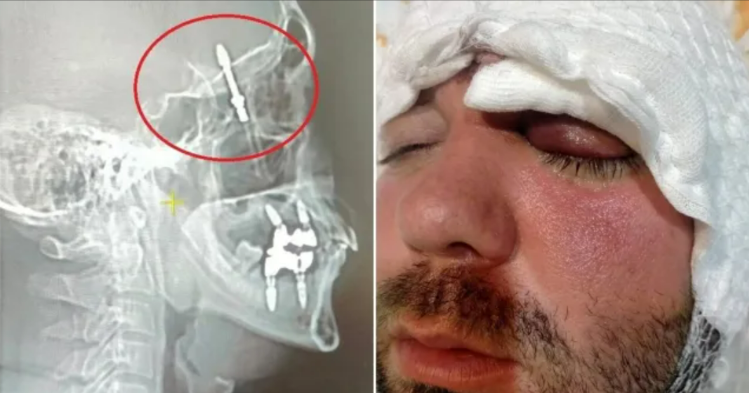
Incredibly, a small-diameter implant was pushed deep into the skull, into the area behind the eye. The doctor who did this took the patient to the emergency room and then ran away.
Whether dental tourism is worth such risks is a decision everyone must make for themselves. However, we recommend thinking very carefully and making thorough inquiries about the doctors and the clinic you plan to visit.

Special price for subscribers

500 UDS when you sign up!
Keep your cart save!

A link to set a new password will be sent to your email address.
Your personal data will be used to support your experience throughout this website, to manage access to your account, and for other purposes described in our privacy policy.

- What is All-on-4 ® ?
- Am I A Candidate?
- Treatment Timeline
- Before & Afters
- All-on-4 ® & Dental Implants
- All-on-4 ® vs Dental Restoration
- Webinars & Seminars
- Payment Plans
- Batemans Bay
- Rockhampton
- Sunshine Coast
- Our Promise
- Our Clinic Network
- Super Clinics
- Accredited Partners
- Refer A Patient
The Hidden Dangers of Dental Tourism
How far are you willing to travel for beautiful, natural-looking, new teeth? Would you be willing to fly to another country in order to save a few thousand dollars? If this idea is bewildering to you, you might be surprised just how many Australians chose to travel overseas for dental treatments each year.
But what seems like a good deal at first, also bears a great amount of danger and uncertainty, from questionable accreditations and substandard education to a lack of regulation and language barriers. We're going to uncover the truth about dental tourism and discuss alternatives that suit any budget.
What is Dental Tourism?
Medical tourism has been booming over the last decade. Even the Australian Dental Association ( ADA ) acknowledges that dental tourism is on the rise. Specialised medical tourism agencies are doing a terrific job advertising cheap dental treatments in popular destinations such as Thailand, Indonesia, Malaysia and the Philippines.
One in five Australians is unable to afford treatment recommended by their local dentist. Who could blame them for seeking alternatives abroad? The promise of all-in-one package deals that not only include dental treatments but an exotic holiday, flights and luxury hotel accommodation, sounds just too good to be true. But what if it is?
It’s Not All Sun, Sea And Smiles
The local dental industry is not the only one losing patients to cheap overseas providers. Cosmetic enhancement surgeries are also becoming more and more popular for overseas travel.
Most people seek treatment abroad when they require complex dental procedures such as full- arch restorations. With out-of-pocket costs of up to several tens of thousands of dollars, these are a lot more expensive in Australia, which is only made worse by the fact that they are not subsidised by the government.
Considering that about half of Australians also don't have private dental insurance, the allure and convenience of dental tourism become undeniable.
- Australians spend up to $300 million each year on health treatments abroad
What Are The Risks Associated with Dental Tourism?
If you are considering travelling abroad for a much needed dental treatment, you should be aware of the involved risks.
A Lower Standard of Dentistry
Australia is continuously ranked in the top 10 countries with the highest medical standards. Local dentists are trained to the highest standard, have to complete a Bachelor of Dental Surgery or Bachelor of Dental Science, be registered with the Dental Board of Australia and renew their registration annually with a minimum of 60 hours of Continuing Professional Development to be met every three years.
With overseas dental treatments , however, it’s unsure what you’re buying into. Overseas dentists may not be working to the same standards or use the same quality of materials. In most cases, it’ll be very difficult to verify accreditations and the actual quality of treatment - and don’t let charming medical tourism agents tell you otherwise.
A Lack of Accountability and Regulation
Australia has systems and regulations put in place to control the quality of dental treatments and give you peace of mind. These include state and federal legislation, state and federal dental boards and the Australian Dental Association (ADA).
When you choose a Next Smile™ dentist to perform your All-on-4 ® procedures , you’re also covered under our full and transparent warranty, as we hold ourselves to the highest standards of excellence, integrity and trust. So if things don’t go as planned or you’re not happy with the results, you know you can fall back on warranty.
Dr Carmelo Bonanno, a dentist and member of the ADA explained in an interview with Choice: "If you see me you know where I've been trained and that I'm registered, and if you're not happy with the work there are avenues to complain." Overseas, you might not only face unexpected costs but might have to fight for yourself in cases of medical malpractice.
No Insurance Support Overseas
In saying that, the more complicated the procedure, the more things can go wrong and being stuck abroad when the unexpected does happen, can quickly become very expensive.
If you can't pay for your urgent medical care and don't have travel insurance that covers emergency situations, you might need to contact your family and friends back home for financial assistance.
Unforeseeable Outcomes
Whilst the Next Smile™ All-on-4 ® approach is backed up by 25 years of clinical research and development expertise and has a 98 per cent success rate , there has been very little documentation regarding the long-term success of similar overseas dental treatments.
The case studies that do exist, point out a general lack of accountability and regulation, particularly when complications arise.
The ADA has published a summary of the risks associated with dental tourism .
Dental Tourism - Things to Consider

If you still decide to seek treatment overseas, here are some considerations to keep in mind!
You’re not booking a vacation
You shouldn’t regard your trip as an overseas holiday. The truth is, it’ll be anything but. Holidays come and go, but bad dental treatments can affect you for the rest of your life. It won’t be a one-stop-shop, so don’t rush it.
Procedures such as All-on-4 ® are complex and require time for the surgeon to carefully plan your surgery. Your new teeth will be ‘made-to-measure’ and after the procedure, you won’t be able to just hop on a flight and go back home right away either - even if you’ve been promised new teeth in a day.
If you’re flying right after you’ve had surgery, you’re greatly increasing your risk for blood clots. You need to allow up to three weeks for postoperative checkups and for it to be safe to fly. If you have a tight schedule, be wary about committing to treatments overseas. If you decide to take the risk, make plenty of time and choose flexible airfares in case you need to stay longer than expected.
Be wary of dentist’ credentials
Doing your homework and researching both the clinic and dental surgeons of your choice is incredibly important. Be wary if a clinic’s online presence appears very sparse and no one seems to have heard of it. Overseas dental clinics usually do not have the same level of clinical research backing their treatments. For that reason, we do not recommend choosing the alternate route, and rather trusting a local provider.
Next Smile™ prides itself on having years of clinical research and experience backing their procedures and techniques. When choosing the All-on-4 ® treatment, you have peace of mind knowing Next Smile™ has already done all the research for you so you know you’re in good hands. Our professional and skilled dentists have been specially trained to perform the All-on-4 ® treatment and can best guide you on your dental procedure.
It is important to note that if you are seeking dental implant work overseas, you should be aware of the quality of implants being used there; as often the implants used are not available in Australia due to not being TGA approved. This means if there are any problems, reputable dental clinics in Australia like Next Smile™ cannot fix them as we do not have the tools that are required for the unusual (often cheap and inferior) implants or technique. You would therefore need to go back to where you originally had the implant procedure done or start again here in Australia which results in spending more time, money and having to increase the length of your recovery.

If considering a dentist overseas, get in touch with the dentist or clinic directly and ask for a full treatment plan, the time frame and total costs. If you feel like they’re not being transparent, hesitate to answer your questions or their answers aren’t satisfying, don’t be afraid to get another opinion and or continue your search locally. Typically, overseas dental clinics may be unable to give you proper answers or avoid discussing certain topics.
Treatments like dental implant surgeries and All-on-4 ® are meant to last a lifetime. If your surgeon is not offering extensive warranties or a lifetime guarantee, you should reconsider.
At Next Smile™, we go above and beyond to make you feel comfortable with your decision and answer any questions you might have so that your procedure goes as smoothly as possible. Trusting your dental provider is incredibly important as dental implants are life-long decisions.
Are You Willing to Accept A Different Level Of Treatment And Care?
Australia has one of the best medical systems in the world, with extremely high standards for hygiene, and procedural routine. No matter where you decide to travel for your dental treatment, you’ll want to make sure that they are able to match the Australian standards to a level that you are comfortable with and used to receiving at home.
Be Prepared To Pay More Money When Things Go Wrong
If complications do arise or you have to return for a second treatment half a year later, you may very well lose the savings you made initially by opting to get treated overseas. Accept that you might need to go back for more work or have to see your local dentist in order to fix problems that arise from the procedure. In the end, you do often get what you pay for.
The fact is, no matter how carefully planned or executed a surgery is, things sometimes simply don’t go as planned. Even though it won’t pay for your surgery, ensure you have travel insurance that covers you on your journey. If anything goes wrong, you could save thousands of dollars in additional medical expenses and avoid being stuck in a foreign country with no immediate help.
Have You Decided Against An Overseas Dental Treatment?
If you do decide to stay at home and seek treatment in Australia instead but are still concerned about the costs involved in the dental treatments you require, there may be payment and financing options you’re unaware of.
Here are some alternative solutions:
- Start with extras insurance: Extras cover will help pay for some of your dental costs, but won't pay for everything. It’s always best for you to check with the dental insurance company on what the rebate would be for their work; often treatment plans will have the item numbers for the treatment being performed. Major dental work categorised by the insurance company is usually capped per annum. Check the fine print because serious dental surgery may fall under your hospital insurance.
- Payment plans tailored to your needs: Many dental clinics, Next Smile™ included, offer flexible payment plans to help anyone afford the quality care they need. Chat to your dentist and their team about financial assistance. They will be happy to help you.
- Early release of your Super: You can apply for the early release of your Superannuation to pay for certain dental treatments in particular if you have a failing dentition. Contact your super provider to find out how to access your funds.
At Next Smile™, we know that you can’t possibly put a price on happiness and comfort. We’re also aware that pricing can be a significant barrier to many Australians who seek treatment.
We believe that everyone deserves a smile to be proud of and provide a range of flexible payment options to make this dream a reality. The friendly Next Smile™ smile team is happy to answer any questions you may have. Give us a call or schedule an obligation-free consultation with your local Next Smile™ clinic today .
You may also be interested in...
Next smile australia’s all-on-4 ® accredited partners, the types of dental surgeons you’ll meet at next smile adelaide, next smile’s all-on-4 ® super clinics.
What Is Dental Tourism?
Medically Reviewed By Colgate Global Scientific Communications

Ready for your annual vacation? Did you schedule your snorkeling excursion? Your museum tours? Your root canal? Wait … what?
When you think of tourism, you probably think of tropical beaches or famous attractions in a foreign city. But some people plan their vacation around dental tourism.
Here's what you need to know about this unique way of traveling, including the why and where of dental tourism. (Plus, the downsides.) And we'll provide ways to get lower-cost dental care without a passport.
Reasons for Dental Tourism
The Washington Post looked at data from the U.S. Bureau of Economic Analysis to report on U.S. citizens' dental and medical tourism expenditures. From 2008-2018, spending increased about 29 percent, with 2018 showing $2.6 billion spent.
Why do tourists travel to foreign countries to seek dental care? A couple of reasons stand out.
Reason One: low-cost dental care
Dental care in the United States can be expensive, even with insurance. Dental tourists spend less in another country, even with travel, lodging, meals, and incidentals added to the dental bill. The Washington Post article noted an 18 percent savings that included a dental procedure plus travel expenses. The Ontario Academy of General Dentistry reports that procedure savings alone can range from 40 to 75 percent.
Dental care costs can be less expensive in foreign countries due to:
- Lower labor and real estate (office) costs due to a lower cost of living
- Less expensive malpractice insurance or no mandates on buying malpractice insurance
- Much less student loan debt incurred by dentists
Reason Two: combining pleasure and unique experiences with low-cost dental care
You might be able to secure low-cost dental services in the U.S. (see below). But can you see Egyptian or Mayan pyramids, Machu Pichu, the Roman Coliseum, or giant Buddha statues?
Also, some dental destinations provide resort-style accommodations along with dental care.
You might opt to have your dental procedure when you first arrive at your location – and recover while seeing the sights. That can also allow you any follow-up visits while you're there.
Popular Destinations for Dental Tourists
Dental tourism has become so popular, there are now dental travel agencies you can find on the web. As with any travel agency, dental travel agencies specialize in finding the best spots to fit your needs.
Since many countries want people to leave with a positive experience, some dental offices promoting tourism have:
- Upgraded their facilities and equipment
- Hired U.S. dental school graduates
- Started providing English-speaking staff
- Became American Dental Association (ADA) members (Yes, the ADA has an international membership branch, the members of which are subject to the same ADA standards as in the U.S.)
In fact, when seeking a dental tourism spot, it's probably a good idea to look for an ADA membership.
Countries promoting their destinations for dental tourists include:
- North America: Mexico, Costa Rica, Guatemala
- South America: Chile, Colombia, Ecuador, Peru
- Africa: Egypt, Morocco
- Asia: India, Malaysia, Philippines, Thailand, Turkey
- Europe: Croatia, Hungary, Iceland, Italy, Poland, Serbia, Spain, The Czech Republic, Ukraine
Downsides of Dental Tourism
While dental care costs less in dental tourism destinations, that doesn't mean traveling for care is best for you. There are potential downsides – and even dangers – associated with traveling for dental procedures.
Dental Standards: Standards for foreign dental practices might not be the same as those in the U.S. For example, infection control standards can vary widely. The Organization for Safety, Asepsis and Prevention (OSAP) provides valuable information and checklists to consult before you travel.
Language Barriers: If dental professionals in other countries speak little or no English and you don't speak the country's language, misunderstandings can occur that might be problematic. Check on the languages spoken at your dental tourism office.
Care Continuity : If you receive dental care in another country, the foreign dentist might not know your dental history. When you return, your own dentist might not know what treatment you received or why it was performed.
It's best to forward your dental records to your foreign dental office. And for a proper follow-up, forward your foreign records to your own dentist.
Issues Within Specific Countries: Check out Centers for Disease Control (CDC) information on vaccines needed, safe travel tips, and health notices for dental tourism countries. And visit the U.S. Department of State site for travel advisories and U.S. contacts once you've arrived.
Ways to Save Money for U.S. Dental Care
Affordable dental care within driving distance isn't out of reach. There are plenty of low-cost (or free) dental options in your own backyard.
Dental and Dental-Related Schools: At dental schools, future dentists provide supervised care at a reduced cost, usually based on a sliding income scale. Depending on the school, dental students offer services like root canals, crowns, and even orthodontics.
Dental hygienists are on the front line of preventative dental care. So, check out local dental hygiene schools for free or low-cost checkups and cleanings.
The ADA has a handy tool to find the nearest accredited school to fulfill your dental needs.
Free or Low-Cost Dental Health Clinics : The U.S. Department of Health and Human Services provides a directory of clinics receiving federal funds. And your town might have state-funded or locally funded health centers, as well. Check with local social service agencies for referrals.
Promotional Rates and Student Discounts: Ask your dental provider about special rates and discounts. If your family has a unique need, your dental office might be able to help or refer you to foundations for financial support.
Plus, ask your dental office about setting up a payment plan or financing before a procedure. Even if you won't save money, it might ease your financial situation to make monthly payments rather than pay your bill in a lump sum. After all, they want their communities to be all smiles.
Your Home Oral Care Routine: Prevention is a key part of saving money at the dentist. Be sure to:
- Brush with fluoride toothpaste twice daily.
- Clean your teeth daily by flossing or using an interdental device.
- Visit your dentist regularly.
- Avoid sugary foods and drinks, especially when snacking.
Traveling for dental care might save you money and seem like a pleasurable way to combine travel and dentistry. Just make sure you do your research on dental tourism destinations – the specific dental practices and their countries. You deserve affordable, high-quality care wherever you are.
Oral Care Center articles are reviewed by an oral health medical professional. This information is for educational purposes only. This content is not intended to be a substitute for professional medical advice, diagnosis or treatment. Always seek the advice of your dentist, physician or other qualified healthcare provider.
ORAL HEALTH QUIZ
What's behind your smile?
Take our Oral Health assessment to get the most from your oral care routine
2.3 billion
people worldwide suffer from tooth decay
Related Articles

Related Products

Prevent plaque, tartar, cavities, and gingivitis all with one toothpaste.

Dissolve and lift away gum harming plaque with daily brushing using Colgate Total ® Plaque Pro-Release Fresh Mint Toothpaste

12-hour protection against germs even after eating and drinking, kills 99% of germs on contact, significantly reduces plaque, helps prevent gingivitis and is alcohol-free.

The Colgate 360 Floss Tip sonic powered toothbrush removes more plaque for a healthier mouth**.

Helping dental professionals

Get the best of your oral health routine and take it to the next level with expert advice, recommendations, products and solutions and special offers.
- Whiter teeth
- Protect your gums
- Kids oral health
- Fighting cavities
- Reduce tooth sensitivity
- Protect enamel
- Reduce plaque
- Better Breath
- Reduce Tartar
Thank you for joining!
We’re excited to have you as a part of our Colgate Community. Your first newsletter is on its way to you now!
- Oral Health
- Oral Health Check
- Product Match
- ColgateProfessional.com
- Shop.Colgate.com</b>"> Shop.Colgate.com
- Terms of Use
- Privacy Policy
- Children’s Privacy Policy
- Terms of Sale
- Cookie Consent Tool
- Do Not Sell My Personal Information

DENTAL TOURISM ASSOCIATION
Your Dream Smile, One Flight Away!
Say hello to exceptional savings! We’d like to guide you to the beauty of dental tourism
HOW CAN THE DENTAL TOURISM ASSOCIATION EMPOWER YOUR JOURNEY?
Welcome to the Dental Tourism Association, your trusted partner in the world of dental care and travel. We don’t just assist with your treatment, we offer a complete dental care tourism experience, packaging high-quality dental care with unforgettable holiday destinations.
Whether it’s exploring the vibrant culture of Tijuana while getting crowns, or soaking in the sun in Cancun after an implant procedure. Whether delving into the historic charm of Istanbul post-root canal treatment or getting veneers in Costa Rica, we curate a journey that ensures both your dental health and leisure are catered for in one of the best countries for dental work.
Our extensive network of clinics, recognized for their strict protocols, unwavering commitment to quality, and licensed practitioners, has provided peace of mind and a healthy smile to the thousands of dental tourists that have trusted in our advice.
We handle the research, guide you to the ideal location, and match you with specialized clinics for your treatment needs. With us, every dental visit becomes a vacation opportunity.

MOST COMMON DENTAL TOURISM TREATMENTS
Comprehensive patient guidelines.
Embarking on a dental tourism journey can save you significantly while receiving top-notch care for common treatments. All-on-4 , veneers , crowns , implants , and full mouth restorations , are all procedures offered at a fraction of the cost in locations such as Mexico and beyond. Quality and affordability come hand in hand when choosing a dentist in our accredited network, providing you with a winning smile without breaking the bank.

WHICH IS THE BEST COUNTRY FOR DENTAL TOURISM?
Exploring the world for the perfect blend of dental care and travel? Our guide offers concise insights into premier destinations. Whether you’re considering the vibrant vistas of Thailand or the Caribbean charm of Mexico, each guide serves as your beacon to informed dental choices and enchanting travels. Dive in and discover your ideal dental vacation.

DENTAL TOURISM MEXICO
Mexico Dental Vacation is one of the best options for Americans and Canadians. A person can save up to 70% on any dental treatment, including dental implants and fixed prosthetics, on average. Every year, up to 3 million tourists visit Mexico for dental care. Find your dental clinic in Mexico!

DENTAL TOURISM DOMINICAN REPUBLIC
The Dominican Republic is a popular destination for affordable and good quality dental care. With a wide range of trained dentists in Punta Cana, patients can receive a variety of procedures, from cleanings to complex surgeries. Its modern facilities can are on par with the best in the world.

DENTAL TOURISM TURKEY
Turkey is one of the best options for European countries, the quality of their dental work and the professionalism of their specialists made it one of the most visited countries in the world. Dentists in Turkey provide quality dental care in any cosmetic and general dentistry treatment.

DENTAL TOURISM COLOMBIA
Colombia has grown its popularity in recent years due to the quality of its dentists. Here dental tourists will find world-class professionals. In Colombia, you would find very good dental care and could visit cities like Bogota, Medellin, Barranquilla, etc.

DENTAL TOURISM COSTA RICA
Costa Rica is a relatively new dental destination that is ideal for nature lovers tourists. The main benefit that it offers to its visitors is the fact that it is quite safe. On the other hand, on average patients will pay up to 70% less for their dental treatment.

DENTAL TOURISM INDIA
One of India's great advantages is the cost of accommodation. It is very low which makes it an excellent option for people from Bangladesh, and the United Kingdom. It is also a great opportunity for those people who are looking for connect with its spiritual side.

DENTAL TOURISM THAILAND
Discover the allure of Thailand where vibrant culture meets exceptional dental care. Renowned for its serene beaches and welcoming spirit, Thailand also boasts cutting-edge dental clinics offering treatments at significant savings. Your dental journey is paired with an unforgettable vacation!

DENTAL TOURISM PUERTO RICO
Puerto Rico invites you to blend tropical escapades with top-tier dental services. As a U.S. territory, it provides the comfort of home with the excitement of an island retreat. You'll find exceptional dental professionals ready to enhance your smile, all within reach of pristine beaches and lush rainforests.
HOW DO WE STREAMLINE THE JOURNEY FOR DENTAL TOURISTS EMBARKING ON A DENTAL VACATION?
Launching your dental vacation is made effortless with our full guidance. The process begins with an understanding of your dental requirements. After this, our dedicated dental tourism coordinators come into play.
We gather a detailed report based on your individual needs, which can be supplemented by any x-rays, pictures, or current treatment plans you have. We then share this information with your chosen clinic. In return, you’ll receive a complete breakdown of the proposed treatment plan, inclusive of costs and options from our accredited clinics across various appealing destinations. This allows you to make an informed decision that harmonizes with your budget, travel desires, and dental health objective:

FIND ALL THE INFO ABOUT YOUR DENTAL TREATMENT

TRAVEL ASSISTANCE AND PERSONALIZED ADVISORY
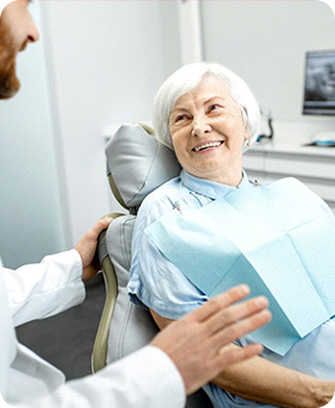
INSURANCE COUNSELING FOR U.S. PATIENTS
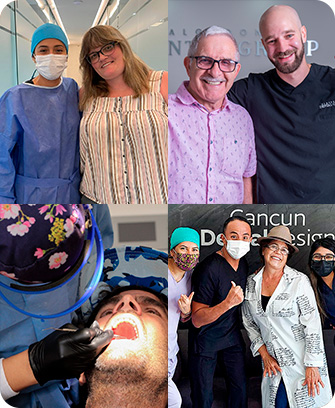
HELP TO BOOK WITH THE DENTIST OF YOUR CHOICE
Get personalized assistance today.
Select the treatment of your interest: Select treatment All on 4 Crowns Veneers Denture Implants Root Canal
I want to visit... (Choose your favorite destinations)
Colombia Puerto Rico Mexico India Dominican Republic Turkey Thailand Costa Rica Spain Any/Other
Your Message
FIND THE BEST DENTAL CLINIC ABROAD – DTA MEMBERS
Certified dental care network, carefully selected partners.
We have a wide list of certified specialists around the world. So you can find your dentist in Cancun, San Jose, New Delhi, etc. Our priority is your well-being and safety.

CANCUN DENTAL SPECIALISTS
Cancun, Mexico

CANCUN DENTAL DESIGN

SMILE MAKEOVER PLAYA
Playa del Carmen, Mexico

X DENTISTRY TIJUANA
Tijuana, Mexico

ESTHETIC DENTISTRY
Puerto Vallarta, Mexico

ALGODONES DENTAL GROUP
Los Algodones, Mexico

ADVANCED CABO DENTISTRY
Los Cabos, Mexico

A1 SMILE DESIGN

PRIME ADVANCED DENTISTRY

ALL IN ONE DENTAL IMPLANT CENTER
Exclusive savings & dental tourism packages.

FREE STAY IN LOS ALGODONES
Valid until March 2024
Free accommodations in comfortable private suites with treatments equal to or greater than $2,000 USD. Experience the ultimate dental vacation with Algodones Dental Group.

FREE LUXURY ACOMMODATION
Valid until June 2024
Don't miss out on this extraordinary opportunity! A1 Smile Design Spend $5,000 USD on our first-class dental services, and receive for free staying in our luxury suites. Write us for more info.

10% OFF ON YOUR DENTAL TREATMENT
Spread the Word, Save Big! Bring 2 Friends and Enjoy a Special Discount on Your Dental Procedure. Advanced Cabo Dentistry , has been the leader in Baja California´s dental turism for the last five years.
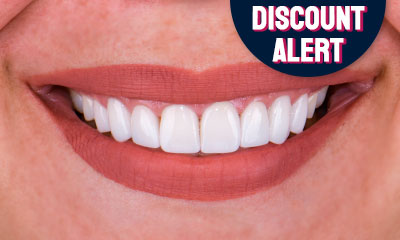
15% OFF ON FULL SET OF VENEERS
Any dental location
Thanks to our extensive network of trusted clinics and dentists, we can negotiate up to 15% additional discounts on a full set of veneers. Dental veneers are an excellent option to improve the appearance of your smile.
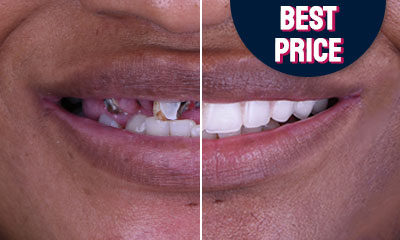
ALL ON 4 ABROAD FROM $9,500 USD
Price per Arch
Discover the secret to affordable dental care abroad! Let us be your guide to the most affordable and highest quality dental treatment abroad. Our team of experts will find you the best deal, leave it in our hands.

LINKING YOU TO THE BEST DEAL
Valid during the entire 2024
Our team is dedicated to finding you the best deal on your dental treatment abroad. We link you to the clinic that offers the best proposal for your case. Take advantage of our special offers and start your dental journey!
GET ALL THE DETAILS ABOUT OUR DISCOUNTS AND PACKAGES!
Fill out the form to learn more about our services and get a healthy, beautiful smile while saving time and money. Our team will contact you with answers to your questions.

Select Promo Select deal Find The Best Deal For Me All On 4 Abroad from $9,500 (per arch) Free Stay In Los Algodones Free Accommodation in Playa del Carmen 15% Off On Full Set Of Veneers 10% Off On Your Treatment In Los Cabos
WHAT IS DENTAL TOURISM ASSOCIATION?
Welcome to the DTA! Our mission is to provide top-quality dental care to those seeking affordable prices abroad.
Finding the right provider in foreign countries can be challenging; that’s why we only work with the most skilled dentists.
Discover with us a world of dental solutions and embark on incredible destinations where excellence and affordability meet.
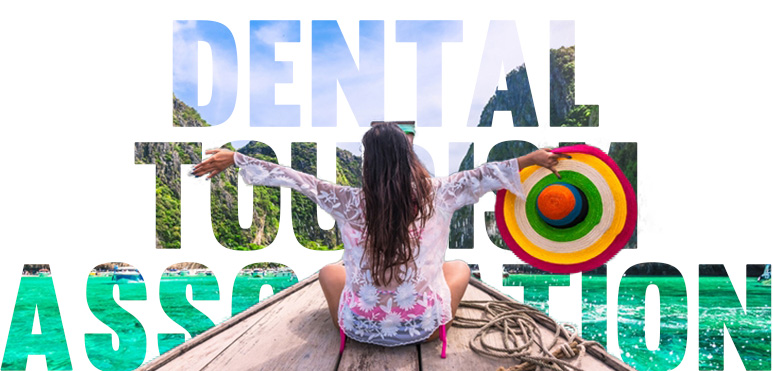
COMPLETE GUIDE FOR DENTAL TOURISTS
Our objective is to guide all those who plan to travel abroad in search of dental work. Especially those looking for affordable dental care that is out of reach in their home country
DENTAL TREATMENTS
Comprehensive guides on the most popular dental treatments. We make sure that we recommend the best dental clinics where the dentists do Dental Treatments abroad in a safe and correct manner. Timelines, costs, benefits, and risks.

DESTINATIONS
Connect with Verified Clinics. They will give you the Dental Care that you need and deserve. Our thorough screening process will insure that the Clinic in Mexico that you visit is on par with American Dental Association (ADA) and CDA standards.

Connect with Verified Clinics that will be able to give you the Dental Care that you need and deserve. Our thorough screening process will insure that the Clinic in Mexico that you visit is on par with American Dental Association (ADA) and CDA standards.

CHECK OUT OUR LATEST POSTS

Cancun Dental Tourism: Expert Guide for an Affordable Dental Vacation
Cancun Dental Tourism Specialists. Tips for the Best Dental Vacations. Top Dentists in Cancun. Prices 2024. Reviews. Best Spots for…

Mexico Dental Town Prices: How Much is Dental Work in 2024?
Updated Mexico Dental Town Prices. Tips for finding reliable Dental Prices. Veneers $550 USD; Crowns $550 USD; Snap-On Denture from…

Is it Worth Getting Dental Work Done Abroad? Unveiling Common Myths about Dental Tourism
Dental tourism offers the prospect of quality dental care at a fraction of the cost, coupled with the excitement of…

Affordable Dental Implants: Understanding the Costs
Before diving into the costs, it’s crucial to understand why dental implants are considered a worthwhile investment. Unlike traditional dentures…
HOW DO WE SELECT THE DENTISTS WE RECOMMEND TO YOU?
We know firsthand the concerns of dental tourists. That’s why we take great care in selecting our recommended dentists. Our mission is centered on helping you to find the perfect clinic that suits your needs. Rest assured that we only suggest professionals who have successfully passed all of DTA’s rigorous review criteria. Dentists must meet the following criteria to be featured in our directory:
Accreditation and Certification
Stellar google reviews, competitive pricing, extensive experience with tourists, dedicated facilities, top-quality materials, frequently asked questions, what is dental tourism.
It is a practice that consists of traveling abroad in order to receive dental care at low costs. This activity is used for two main purposes. The first one is to get a lower pricing for treatments such as dental implants, veneers, and crowns. The second one is optimize their budget to travel, get to know another country, and, receive a dental treatment.
What are the advantages of dental treatment abroad?
Many people choose to travel to other countries to undergo dental procedures for good reasons. These are some of the advantages of this popular practice
- Huge savings
- High-quality dental care
- Shorter and optimized time-frames
- Opportunity to get to know another country
- Excellent treatment and service
WHY IS DENTAL CARE TOURISM SO CHEAP?
With the rising popularity of dental care tourism, countries around the world have invested in state-of-the-art facilities and highly skilled professionals who provide exceptional dental care at affordable rates. But why dental care abroad is so cheap?
In addition to the cost of living, dental tourism destinations benefit from economies of scale and favorable exchange rates, enhancing affordability. This allows dental clinics to provide exceptional services and treatments at significantly reduced prices, making it an irresistible choice for those seeking budget-friendly dental solutions.
Whether you require routine dental cleanings, teeth whitening, cosmetic dentistry, or complex procedures like dental implants, dental destinations offers a plethora of options tailored to your needs. Explore the world, experience different cultures, and return home with a bright smile.
Embrace the exciting world of dental tourism, where quality, affordability, and unforgettable experiences converge. Start planning your dental vacation today and unlock a world of possibilities for your dental health and your wallet.
How to Prepare for Your Dental Vacation?
Planning a dental vacation can be exciting, but it’s important to prepare to ensure a smooth and stress-free experience. Here are some tips to help you get ready for your dental travel:
- Prepare your documents: We recommend you have photos and copies of all your formal identification documents and medical records.
- Pack smart for your dental vacation: Take with you comfortable clothes (for any weather), sunscreen, and all of your prescriptions.
- Plan your itinerary: Even though the dental procedure is the first priority, plan some free time to enjoy your destination. Plan your trip if you want to save even more money.
- Consider recovery: Depending on the procedure, you may need time to recover. Plan for healing time and include it in your travel plans.
- Communicate with your dentist:
Is dental tourism worth it?
Dental tourism is worth it for many reasons. These include cost savings, high-quality care, access to advanced procedures, shorter wait times, and travel opportunities. By traveling abroad for dental work, people receive the best quality of care for a fraction of the cost. Additionally, many dental destinations have highly trained and experienced dentists who provide personalized care and attention to their patients. In some cases, dental locations also have access to modern techniques that are not available in other countries. Dental travel also gives the chance to discover the world. It is a great option for those who want to combine dental care with a vacation.
WHICH ARE THE MOST COMMON METHODS OF PAYMENTS OVERSEAS?
Most dental clinics abroad accept major credit cards, such as Visa, Mastercard, and American Express. This allows you to pay for your dental treatments using your preferred credit card, providing you with flexibility and convenience. Additionally, many clinics also accept debit cards, ensuring that you have multiple options for payment.
Another popular payment method accepted for dental work abroad is bank transfers. This method allows you to transfer the funds directly from your bank account to the dental clinic’s account. It provides a secure and straightforward way to handle the payment process, particularly for larger treatment costs.
In some cases, dental clinics may also accept cash payments in the local currency. This option can be beneficial for those who prefer to pay in cash or for individuals who want to avoid potential currency conversion fees.
It’s important to note that different clinics may have varying policies regarding payment methods. Therefore, it’s advisable to communicate with your chosen dental clinic beforehand to confirm which payment methods they accept. This way, you can plan accordingly and ensure a seamless payment process.

The Dental Tourism Association is your trusted guide! We connect you with top-notch dental specialists across the globe, who fuze quality with affordability. We’re here to transform your dental travel into a seamless, rewarding experience.
- DTA MEMBERS
- BEST COUNTRIES
CAN WE HELP YOU?
- Copyright © 2024 All Rights Reserved by Dental Tourism Association
- Privacy Policy
ALL ON X MEXICO PRICE LIST 2023
Smile beyond borders.
Fill out the form to download our complete All on 4 Price List!

Navigate forward to interact with the calendar and select a date. Press the question mark key to get the keyboard shortcuts for changing dates.
Navigate backward to interact with the calendar and select a date. Press the question mark key to get the keyboard shortcuts for changing dates.

Astrakhan on your mind?

Multi-city stops
Top places to visit, 1 astrakhan kremlin.
All road trips from Astrakhan
- Astrakhan to Tbilisi drive
- Astrakhan to Jerusalem drive
- Astrakhan to Sochi drive
- Astrakhan to Baku drive
- Astrakhan to Volgograd drive
- Astrakhan to Yerevan drive
- Astrakhan to Tel Aviv drive
- Astrakhan to Batumi drive
- Astrakhan to Petra - Wadi Musa drive
- Astrakhan to Lindos drive
- Astrakhan to Peterhof drive
- Astrakhan to Tehran drive
- Astrakhan to Selcuk drive
- Astrakhan to Esto-Sadok drive
- Astrakhan to Krasnodar drive
- Astrakhan to Alanya drive
- Astrakhan to Rostov-on-Don drive
- Astrakhan to Kislovodsk drive
- Astrakhan to Beirut drive
- Astrakhan to Pamukkale drive
- Astrakhan to Manavgat drive
- Astrakhan to Oswiecim drive
- Astrakhan to Wieliczka drive
- Astrakhan to Samara drive
- Astrakhan to Kyrenia drive
- Astrakhan to Eilat drive
- Astrakhan to Amman drive
- Astrakhan to Isfahan drive
- Astrakhan to Gelendzhik drive
- Astrakhan to Nessebar drive
Explore nearby places
- Tatarskaya Bashmakovka
- Verkhnekalinovskiy
- Revin Khutor
- Aksarayskiy
- Selitrennoye
- Yenotayevka
- Tsagan Aman
- Nizhniy Baskunchak
- Bolshoy Tsaryn
- Fort Shevchenko
All related maps of Astrakhan
- Map of Astrakhan
- Map of Solyanka
- Map of Tatarskaya Bashmakovka
- Map of Nachalovo
- Map of Kamyzyak
- Map of Ikryanoye
- Map of Verkhnekalinovskiy
- Map of Altynzhar
- Map of Revin Khutor
- Map of Aksarayskiy
- Map of Makovo
- Map of Oranzherei
- Map of Rechnoye
- Map of Liman
- Map of Selitrennoye
- Map of Lagan
- Map of Yenotayevka
- Map of Gremuchiy
- Map of Tsagan Aman
- Map of Yashkul
- Map of Nizhniy Baskunchak
- Map of Chilgir
- Map of Akhtubinsk
- Map of Bolshoy Tsaryn
- Map of Fort Shevchenko
- Map of Elista
- Map of Enbekshi
- Map of Kizlyar
- Map of Leninskiy
- Map of Saura
- Map of Elton
Astrakhan throughout the year
- Astrakhan in January
- Astrakhan in February
- Astrakhan in March
- Astrakhan in April
- Astrakhan in May
- Astrakhan in June
- Astrakhan in July
- Astrakhan in August
- Astrakhan in September
- Astrakhan in October
- Astrakhan in November
- Astrakhan in December
Looking for day-by-day itineraries in Astrakhan?
Get inspired for your trip to Astrakhan with our curated itineraries that are jam-packed with popular attractions everyday! Check them out here:
- 1-Day Astrakhan Itinerary
- 2-Day Astrakhan Itinerary
- 3-Day Astrakhan Itinerary

Astrakhan Oblast Travel Guide: All You Need To Know
Astrakhan Oblast is a federal subject (oblast) of Russia located in the southern part of the country, near the border with Kazakhstan. It is known for its unique blend of cultures, stunning natural landscapes, and historical significance. The administrative center of Astrakhan Oblast is the city of Astrakhan. Here’s some information about Astrakhan Oblast:
Places to Visit in Astrakhan Oblast: Astrakhan Kremlin: Explore the historic Astrakhan Kremlin, which features a combination of architectural styles and is home to several museums and churches.
Volga River Embankment: Stroll along the picturesque Volga River embankment, enjoy scenic views, and visit the nearby Park of Culture and Leisure.
Lotus Lake: Visit Lotus Lake (Lake Bolshoye Yarovoye) during the summer months when it’s covered in lotus flowers, creating a mesmerizing natural spectacle.
Astrakhan State Opera and Ballet Theater: Attend a performance at this renowned theater and experience the city’s cultural scene.
Astrakhan State Historical and Architectural Museum-Reserve: Learn about the history, culture, and traditions of Astrakhan and the region through the museum’s exhibitions.
Kharabali Astronomical Observatory: Explore the observatory and learn about astronomy through guided tours and observation of celestial objects.
Best Time to Visit Astrakhan Oblast: Late Spring to Early Autumn (May to September): This period offers the most pleasant weather for exploring the region and enjoying outdoor activities. Things to Do in Astrakhan Oblast: Outdoor Adventures: Enjoy activities such as fishing, birdwatching, and exploring the natural landscapes along the Volga River.
Cultural Experiences: Visit local markets and try traditional Russian and regional cuisine, including dishes featuring fish and rice.
Boat Tours: Take boat trips along the Volga River and its delta to explore the local flora and fauna.
Photography: Capture the unique natural landscapes, lotus flowers, and cultural sites with your camera.
How to Get Around Astrakhan Oblast: Public Transportation: Astrakhan has a public transportation system that includes buses and trams for getting around the city. In rural areas, public transportation may be less developed.
Taxis: Taxis are readily available in the city and can be used for local transportation.
Walking: The city center of Astrakhan is walkable and ideal for exploring on foot.
Where to Eat in Astrakhan Oblast: Local Cuisine: Savor traditional Russian and regional dishes, such as fish soup, pilaf, and dishes featuring local fish and rice.
Cafes and Restaurants: Explore local dining establishments that offer both Russian and international cuisine.
Local Markets: Look for local food vendors and markets selling fresh produce, regional specialties, and handmade crafts.
Where to Stay in Astrakhan Oblast: Astrakhan offers a range of accommodation options, including hotels, guesthouses, and hostels. The city provides various lodging choices to suit different budgets and preferences.
Travel Tips for Astrakhan Oblast: Language: Russian is the primary language spoken in Astrakhan Oblast, and English may not be widely understood, especially in rural areas.
Currency: The currency used is the Russian Ruble (RUB). Credit cards are widely accepted in hotels and restaurants, but it’s a good idea to carry cash for smaller establishments and markets.
Safety: Astrakhan is generally safe for tourists, but practice standard safety precautions regarding your belongings and personal safety.
Climate: The region experiences hot summers and cold winters, so pack accordingly depending on the season.
Local Customs: Be respectful of local customs and traditions when visiting cultural or historical sites and interacting with local communities.
Astrakhan Oblast offers a unique blend of cultural experiences, natural beauty, and a rich history. By following these travel tips, you can have an enjoyable and enriching visit to this region in southern Russia.
You might also enjoy:
Hangzhou travel guide: all you need to know, yamoussoukro (also the political capital of côte d’ivoire) travel guide: all you need to know, cuilapa uncovered: your comprehensive travel guide to this hidden gem in guatemala, glacis, seychelles: a tranquil paradise for beach lovers and nature enthusiasts, leave a comment cancel reply.
Your email address will not be published. Required fields are marked *
Save my name, email, and website in this browser for the next time I comment.

IMAGES
COMMENTS
Dental tourism is on the rise. Over half reported seeing cases in the past three years, with a fifth seeing cases during the pandemic. Nearly 85% of all dentists said in their view dental tourism is a growing trend. ... Dentists want the authorities to step up, and raise awareness of the risks, including genuinely proactive campaigns to inform ...
Benefits and Risks of Dental Tourism. As dental tourism becomes an increasingly compelling option for many people, it's worth considering the benefits and potential risks. While the advantages of traveling for dental care may seem obvious, the drawbacks may not be as obvious. Advantages of Seeking Dental Treatment Abroad
The Growing Popularity of Dental Tourism. Dental tourism has become popular because many people lack dental insurance amid the rising healthcare costs. The US health spending increased by 4.1% in 2022 to $4.4 trillion. It also grew by 4.1% in 2021.
In recent years, dental tourism has emerged as a tempting option for individuals seeking affordable dental care or specialized procedures. However, beneath the surface allure of cost savings and exotic destinations lie a multitude of risks and considerations that warrant careful attention. Let's delve into the potential pitfalls of dental tourism and why proceeding with […]
Variability in Standards. One of the most pressing concerns with dental tourism is the inconsistency in healthcare standards and quality of care. While many countries have highly skilled dental professionals, the regulatory frameworks governing dental practices can vary widely. This variation can lead to treatments that are below the standard ...
Dental tourism has risks, but being prepared for your trip can minimize them. SolStock/iStock via Getty Images. Dental care in the U.S. can be very expensive — especially if you need a complex procedure or are one of the 77 million American adults (3 in 10) who lack dental insurance.
People travel for a range of dental procedures including having implants, crowns and bridges fitted, or for dentures, root canal treatment, fillings, veneers and teeth whitening. In Australia ...
Medical, or dental tourism, is when patients travel abroad for the purpose of medical or dental treatment. In 2010, around 63,000 UK citizens travelled abroad for treatment. 1 It has been reported ...
Risks Associated with Dental Tourism. Quality and Standards of Care: One of the biggest concerns is the variance in quality and standards of care between countries. Not all destinations may have the same stringent regulatory environments, potentially leading to lower standards of healthcare.
Concerned about the tourists' perceptions of Mexico as dangerous and unsafe, those who work within the dental tourism industry in Los Algodones have been lobbying the council for improvements to ...
Travel-Related Risks. Traveling after a dental procedure, especially major ones, can increase the risk of complications. The stress of travel, potential exposure to different bacteria and viruses, and even the act of flying (changes in cabin pressure) can negatively impact healing.
Risks involved in dental tourism. Since money seems to be the primary factor for dental tourism, there are risks and standards that many patients are either unaware of or feel the risk is worth the savings. The foremost risk is the standard of infection control. In the United States, there are protections and standards in place to ensure ...
Today, we're breaking down the biggest dangers related to dental tourism! 1. There may be little to no regulation whatsoever. The American Dental Association (ADA) and the U.S. Food and Drug Administration (FDA) heavily regulate all dental practices in the United States and require diligent standards to be upheld by doctors.
Whether dental tourism is worth such risks is a decision everyone must make for themselves. However, we recommend thinking very carefully and making thorough inquiries about the doctors and the clinic you plan to visit. Risks of dental tourism include chronic pain, infections, and costly complications. Warn patients about veneers and implants ...
The head of the Istanbul Chamber of Dentists, Berna Aytaç, says she still believes in medical tourism but is worried about the number of students wanting to get into the profession. In 2010 ...
Before you book a trip, you should consider the risks of going outside the United States for your needs. We'll break down the top 5 risks for you so you can decide how far you're willing to go for oral care. 1. Lack of Regulation. If you have a dental procedure done in the United States, you can rest assured that your dental professional is ...
The ADA has published a summary of the risks associated with dental tourism. Dental Tourism - Things to Consider If you still decide to seek treatment overseas, here are some considerations to keep in mind! You're not booking a vacation; You shouldn't regard your trip as an overseas holiday. The truth is, it'll be anything but. Holidays ...
Dental tourism has become so popular, there are now dental travel agencies you can find on the web. As with any travel agency, dental travel agencies specialize in finding the best spots to fit your needs. ... There are potential downsides - and even dangers - associated with traveling for dental procedures. Dental Standards: Standards for ...
Embarking on a dental tourism journey can save you significantly while receiving top-notch care for common treatments. All-on-4, veneers, crowns, implants, and full mouth restorations, are all procedures offered at a fraction of the cost in locations such as Mexico and beyond.Quality and affordability come hand in hand when choosing a dentist in our accredited network, providing you with a ...
Read travel guides & discover the best attractions to see and the best restaurants to eat at in Astrakhan
Storm Lilian brought travel disruption to parts of the UK on Friday, with more strong winds and rain forecast for Saturday. The heaviest of the rain is expected to move away around mid-afternoon ...
Astrakhan Tourism: Tripadvisor has 11,283 reviews of Astrakhan Hotels, Attractions, and Restaurants making it your best Astrakhan Tourism resource.
Top Astrakhan Oblast Gardens: See reviews and photos of Gardens in Astrakhan Oblast, Russia on Tripadvisor.
Travel Tips for Astrakhan Oblast: Language: Russian is the primary language spoken in Astrakhan Oblast, and English may not be widely understood, especially in rural areas. Currency: The currency used is the Russian Ruble (RUB). Credit cards are widely accepted in hotels and restaurants, but it's a good idea to carry cash for smaller ...